World of Wall Panels for Interior Decoration and Selection Criteria
The first finishing panels, similar to modern ones, were used in medieval France to decorate palaces and were called buazeries. Aristocracy was a sign of these times, such as carved wooden and glass buazeries, particularly with gilding.
The most popular and affordable modern panel types are plastic or MDF paneling. Materials made from solid wood, such as oak, bamboo, particle board, acrylic glass, gypsum, and more, are also used for interior finishing of apartments. The expensive "palace" solid wood can say a lot about the owners and their wealth, but any type of material has its advantages.
Decorative panels are often used in trendy design projects because they:
- elegantly replace plaster or wallpaper
- can be printed with photographs or relief patterns
- hide wall defects
- plus retain heat in the room and provide sound insulation.
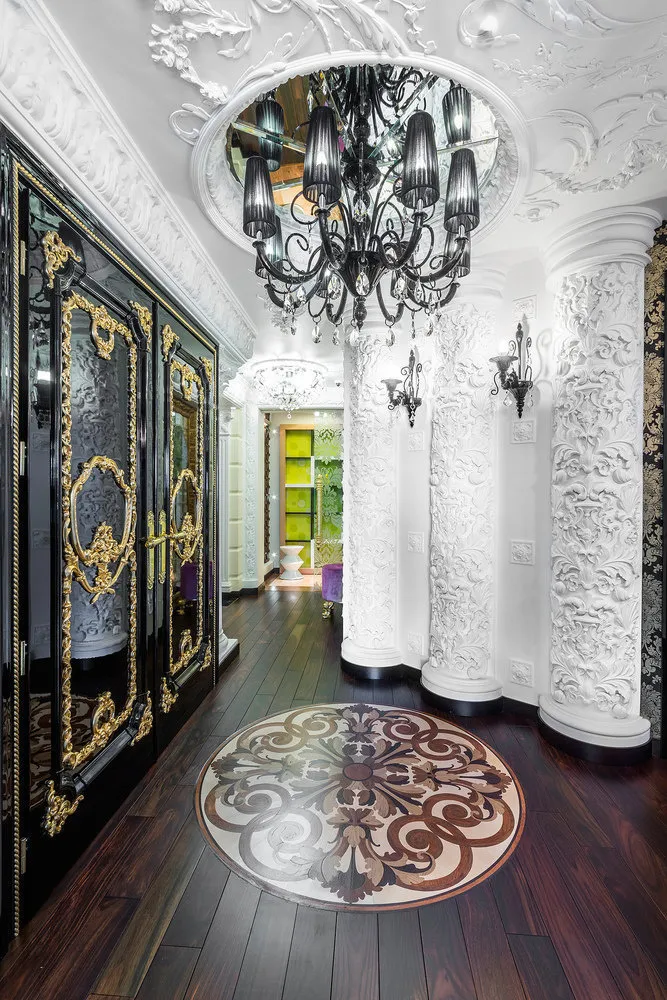
The only drawback of such panels is that they are more expensive than other finishing materials.
However, even inexpensive wall panels made of PVC can imitate natural stone or wood textures and make walls perfectly smooth. In addition, paneling or other types reduce renovation time – no special surface preparation is needed for installation. These materials are ideal for balcony or loggia finishing.
If panels are mounted on a special frame, cables can be easily hidden underneath. If needed, one or more panels can be removed.
Wooden paneling is especially durable and long-lasting. Any original design solution can be implemented by combining different wall panels for interior finishing – from PVC, glass, and natural materials.
However, it is important to know other nuances of material selection.
How to Choose Wall Panels
Wall panels are successfully used for wall cladding in bathrooms, kitchens, and even public spaces. It is important to choose the right, durable, and eco-friendly material for each specific case.
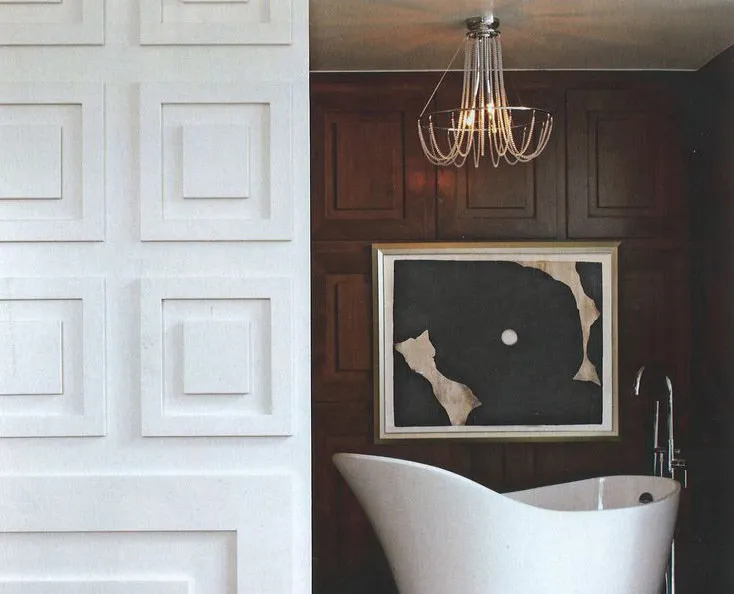
All types of panels are assigned a specific fire safety class. For interior finishing of living rooms, decorative models with marking G1 (low flammability) and T1 (low risk, do not emit toxic substances when burning) are ideal. For example, panels made of gypsum board and wood veneer.
For bathroom use, it is better to choose wall panels that are resistant to moisture – made of plastic. These are classified as moderately flammable.
There are also decorative panels designed for public spaces, particularly durable and flexible, and such models can be used in hallways or entryways. If a wall will be finished near a radiator, it is especially important to select material that is insensitive to high temperatures.
Besides material properties, the shape of wall panels also matters.
Types of Panels by Shape
Wooden or plastic panels are produced in the form of paneling and strips. Standard panel width is 10 to 12.5 cm. Strip decorative panels have a width up to 30 cm and length from 2.6 to 3 m.
Such models of decorative materials are suitable for finishing small rooms, are easy to mount and connect. Strips can be mounted vertically, horizontally, or a combination of both methods.
Wooden, gypsum, and other trendy panels can also be in the form of tiles, square or rectangular. The side length of one tile can be from 30 to 98 cm.
These wall panels are used for interior finishing of large rooms, one wall, or a specific area. Rectangular models can be used to elegantly finish and visually elongate a room. Textured tiles allow creating an impressive pattern on the wall.
Wall panels made from inexpensive wood materials (e.g., particle board) and plastic are also produced in the form of sheets. The standard size of one sheet is 122 by 244 cm. These products are often intended for wall finishing in large office spaces, frequently imitating natural stone or wood. Moldings used for mounting also become decorative elements.
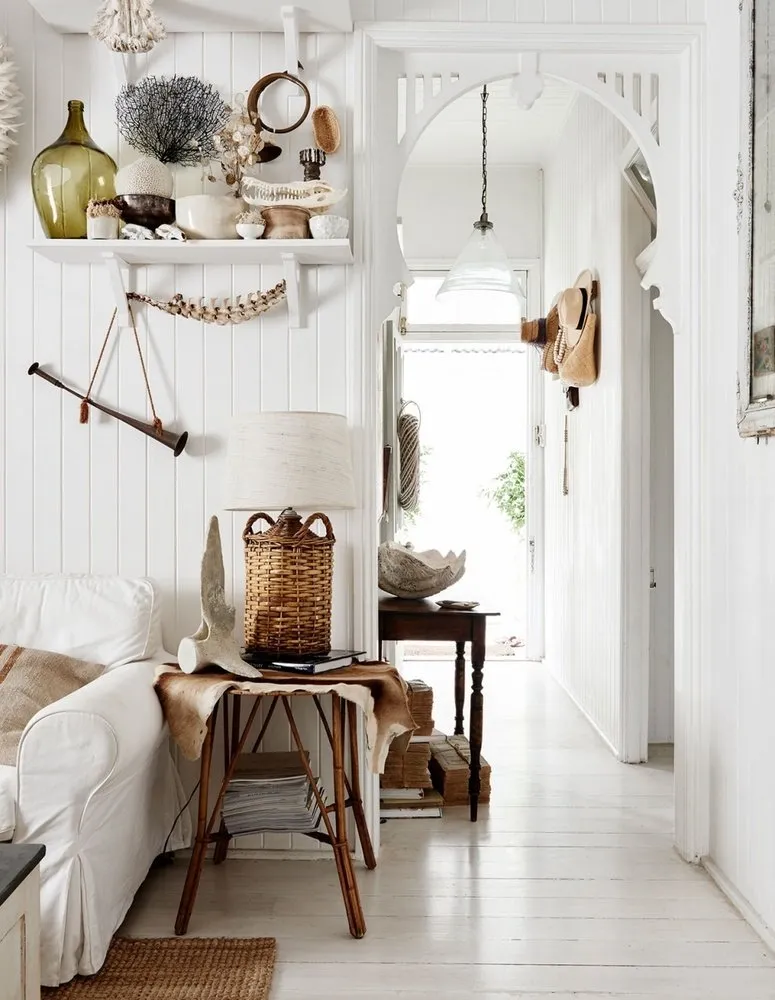
Excursion on Materials and Styles of Living Spaces
The most prestigious type of wall finishing is decorative panels made from wood and glass. These are already associated not only with French rooms of aristocrats.
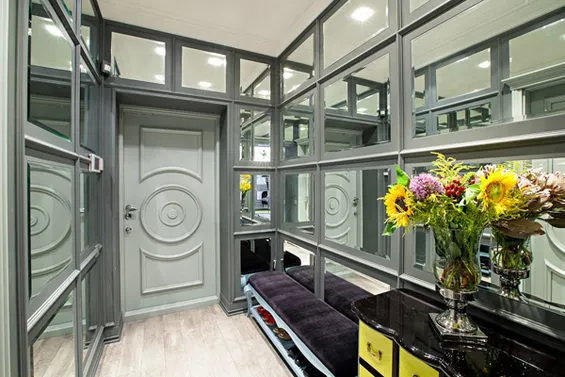
Finishing with Natural Wood
Wall panels for interior finishing made from solid wood – oak, birch, maple, ash, or wenge – are the most valuable and always look magnificent. This material is suitable if you want to create a classic interior, for example, like in England.
In a room in expensive English style of the 19th century, the lower part of the wall should be clad with wood. The upper part can be decorated with wallpaper or MDF tiles. Style elements can be enhanced with mirror or gold inserts.
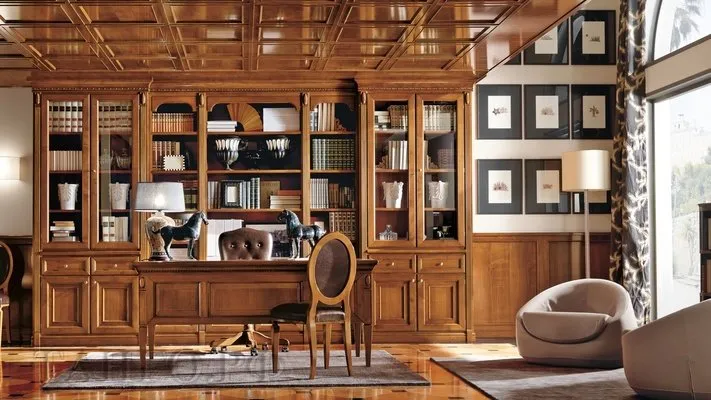
Design: Tatiana Bezverkhiya
This designer solution can be implemented in the design of a study, living room, or hallway. Wooden panels without special treatment should not be used for bathroom walls.
Wooden paneling, natural or painted white, can also become a background for elements of Scandinavian interior, provincial American, or Provence style. This is an excellent eco-friendly material for a bedroom.
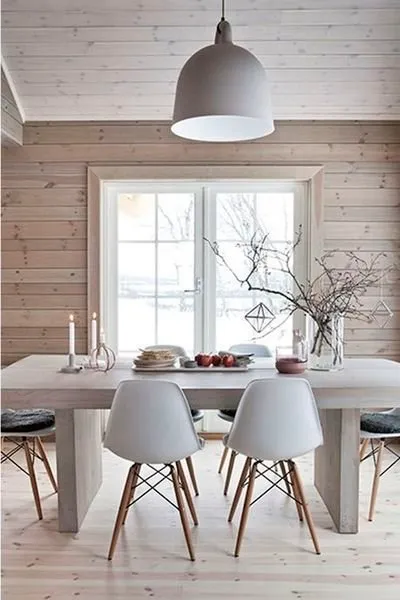
Design: Tatiana Bezverkhiya
Cork and Other Exotic Materials
Very interesting will look wall finishing options made from cork wood or bamboo if the interior is entirely designed in Japanese, Chinese, African, or another ethnic style.
Cork panels, in addition to being non-polluting, do not accumulate condensation.
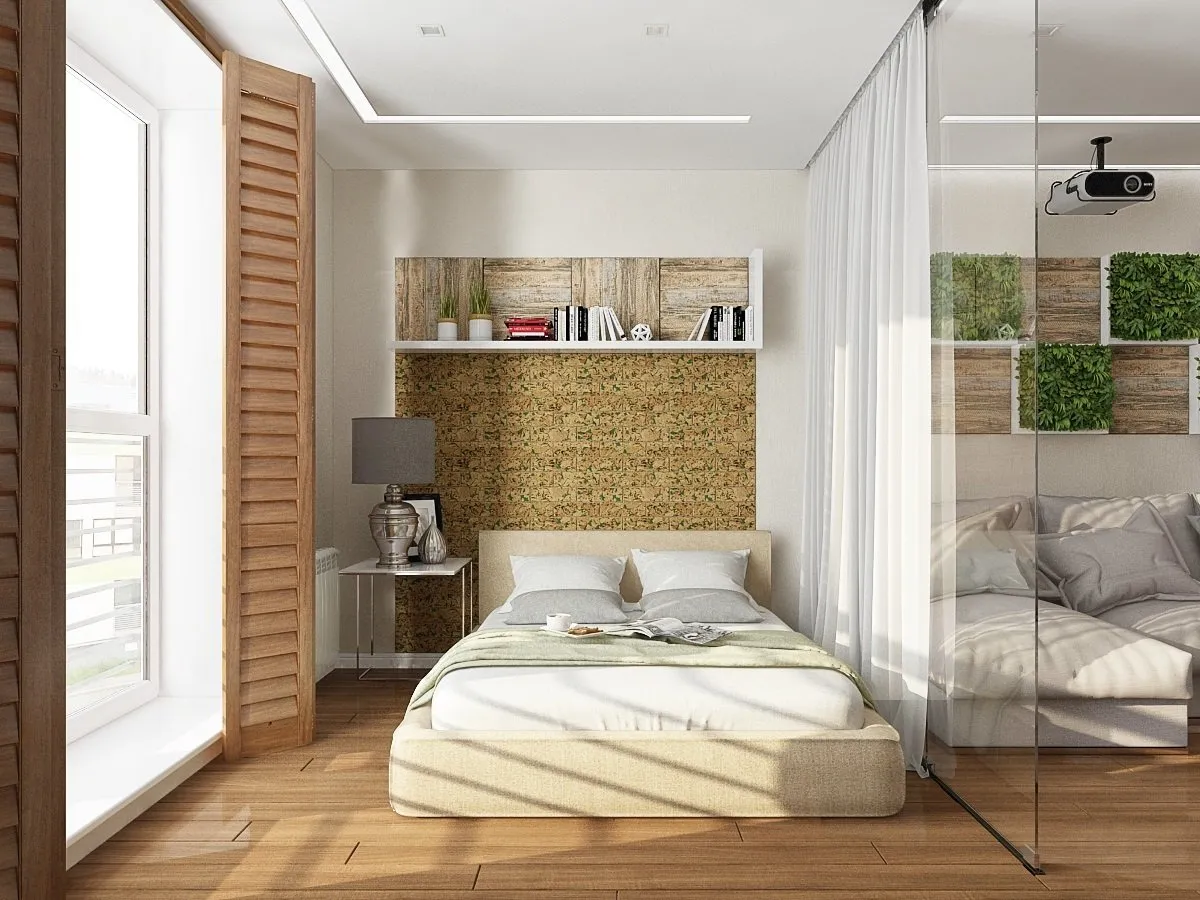
Design: Eugenia Ermolaeva
There are also decorative panels made from crushed oak or ash. For a living room or hallway in industrial style, these are the most suitable wall tiles – natural, relief, and durable.
Budget Finishing with Wood Materials
Instead of solid wood tiles, more simple and affordable types of wall panels are often used – made from particle board or lumber. These finishing materials are quite durable, retain heat, can have multiple layers and natural cladding.
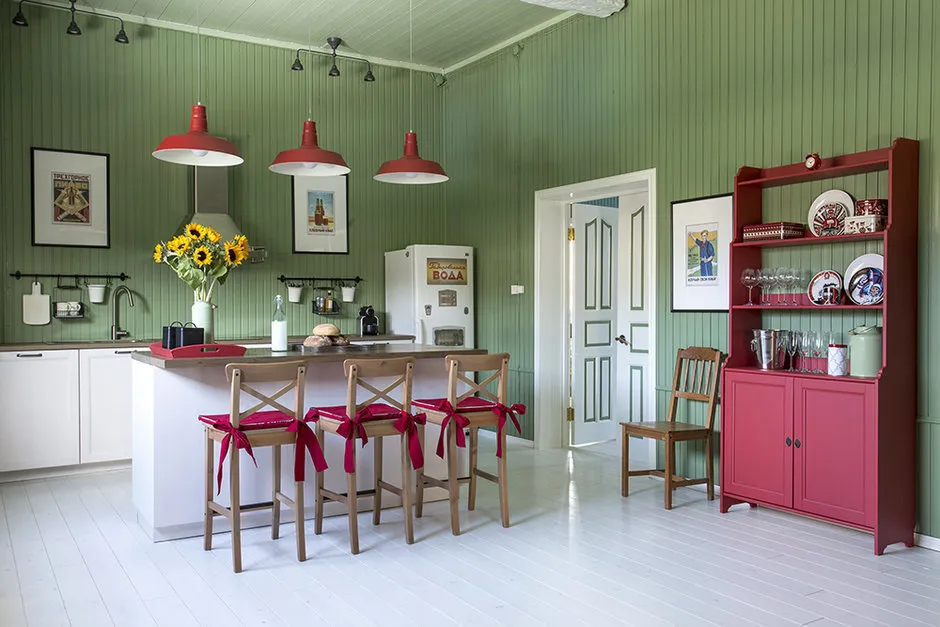
Design: Eugenia Zhedanova
For example, particle board (DSP) tiles are coated with plastic. These are mainly used in hallways or foyers.
Oriented strand board (OSB) and MDF panels are produced in the following variants:
- veneered
- laminated
- colored
- with fabric finishing.
The choice of designs is vast.
Like panels made from natural wood, they are durable, safe, and suitable for residential spaces. At the same time, they have a small weight and can be easily removed if necessary. It should be remembered that all wood panels are sensitive to high humidity.
Gypsum and Gypsum Vinyl
Gypsum wall panels are used for interior finishing when a textured or plastered decor is needed, and they look great in classic or antique interiors.
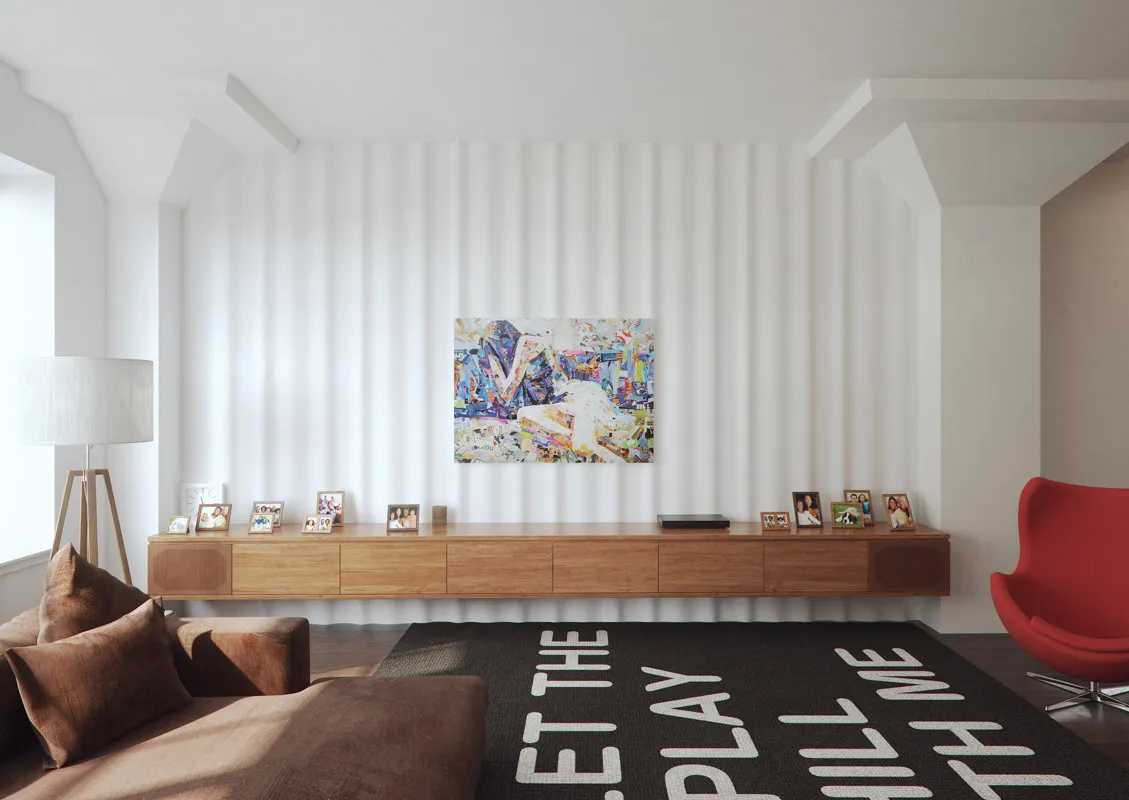
How to Use Gypsum in Interior Design
The advantage of gypsum is that it is hypoallergenic and very durable, easy to process and restore, and individual tiles can be easily replaced if needed.
Even more popular and practical is gypsum vinyl – gypsum with vinyl film. Designer GVK panels can be used instead of wallpaper, but no wall leveling is required for installation. For a spacious classical room with high ceilings, such tiles are an excellent choice.
Paneling and Plastic Tiles
Decorative wall panels made from PVC are the most economical and moisture-resistant. These products have a two-layer structure, and reinforcing inserts made from pressed crushed stone can be included. Modifications of plastic tiles are used for internal wall finishing in non-residential areas of apartments:
- bathrooms
- kitchens
- hallways
- loggias
- utility rooms.
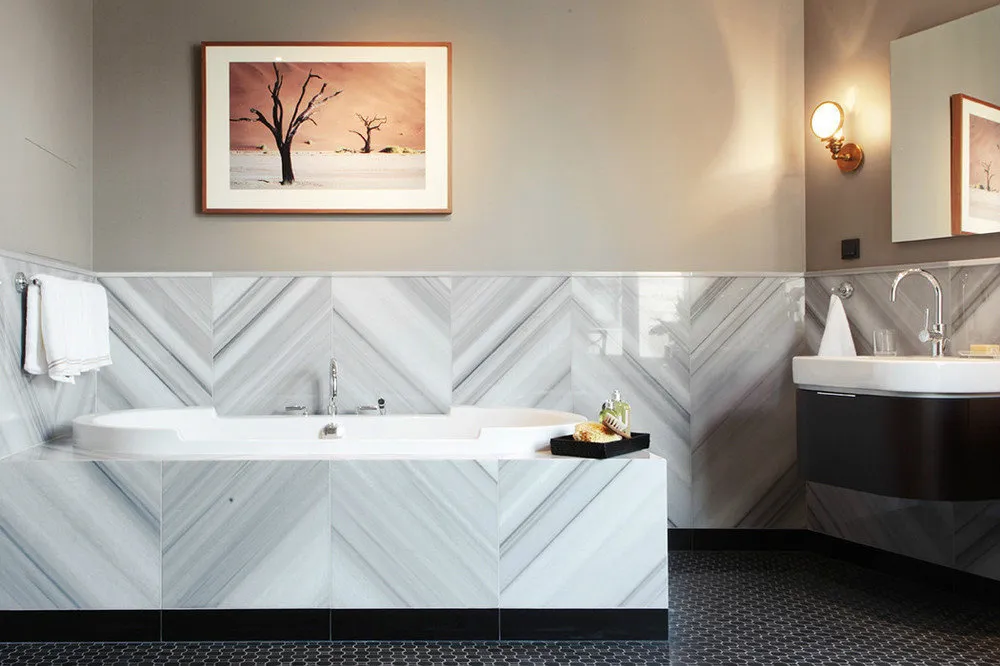
Design: Sergey Ogurtsov
The surface of plastic can imitate stone, mosaic, wood, and such tiles will harmonize well in a modern functional interior.
PVC panels are not suitable only for bedrooms and spacious living rooms in expensive styles.
Glass Skinals
Panels made from different types of glass – tempered, acrylic – are an ideal material for the kitchen work zone, easy to maintain and elegant. These tiles or skinals are produced in various original variants – with decorative backing or sandblasted pattern, decorated with precious stones.
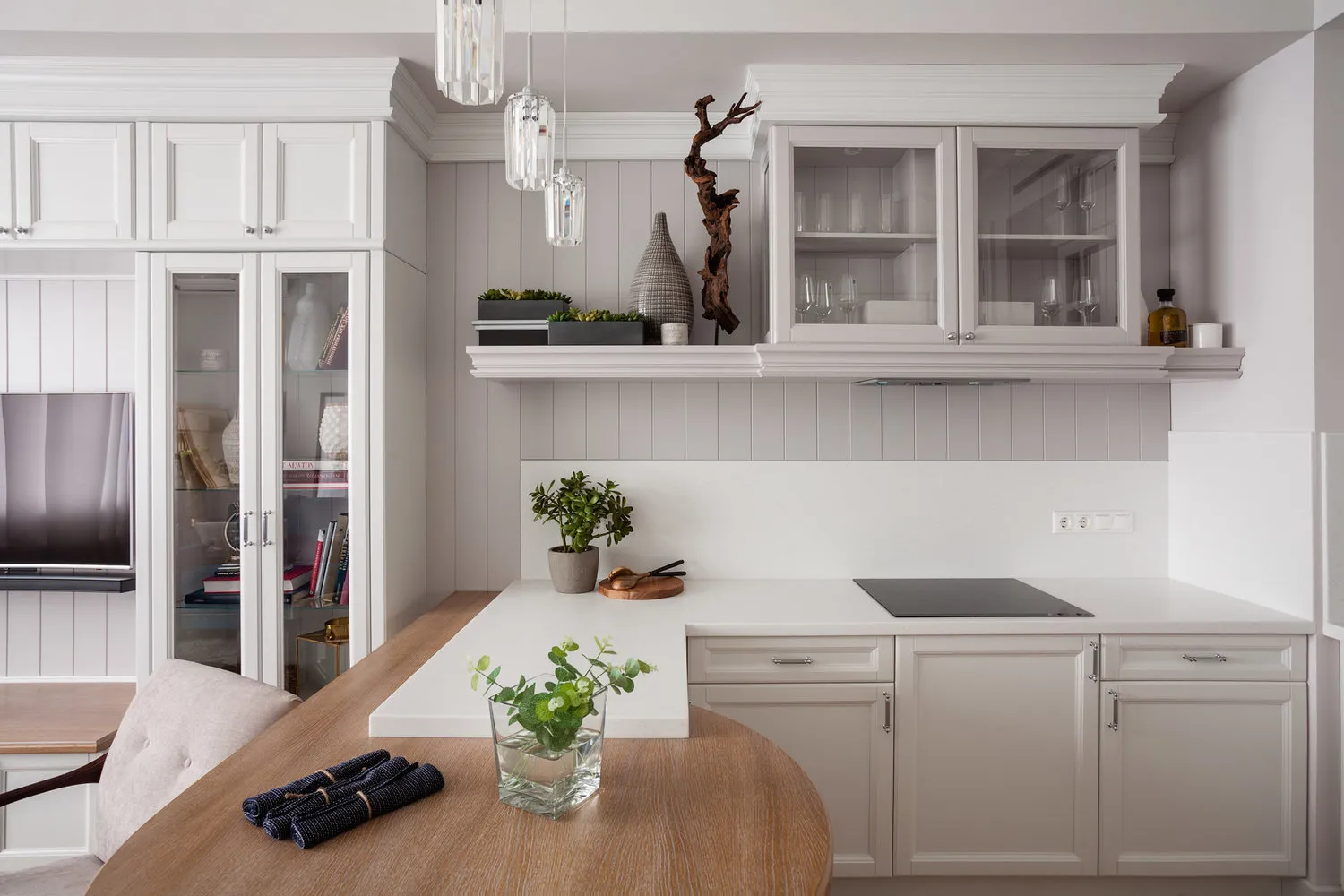
Design: Vitaliy Martynov and Anastasia Rykova, S-Style Studio
Using skinals for wall finishing and spot lighting or LED backlighting, it is easy to create beautiful color shifts and add a unique touch to an interior with elements of techno or romance. These tiles are made for any style.
To make kitchen work pleasant, you can always select durable glass tiles with a specific color or photograph of a beautiful place.
Stone Veneer
This is already a modern category of durable designer panels for wall finishing.
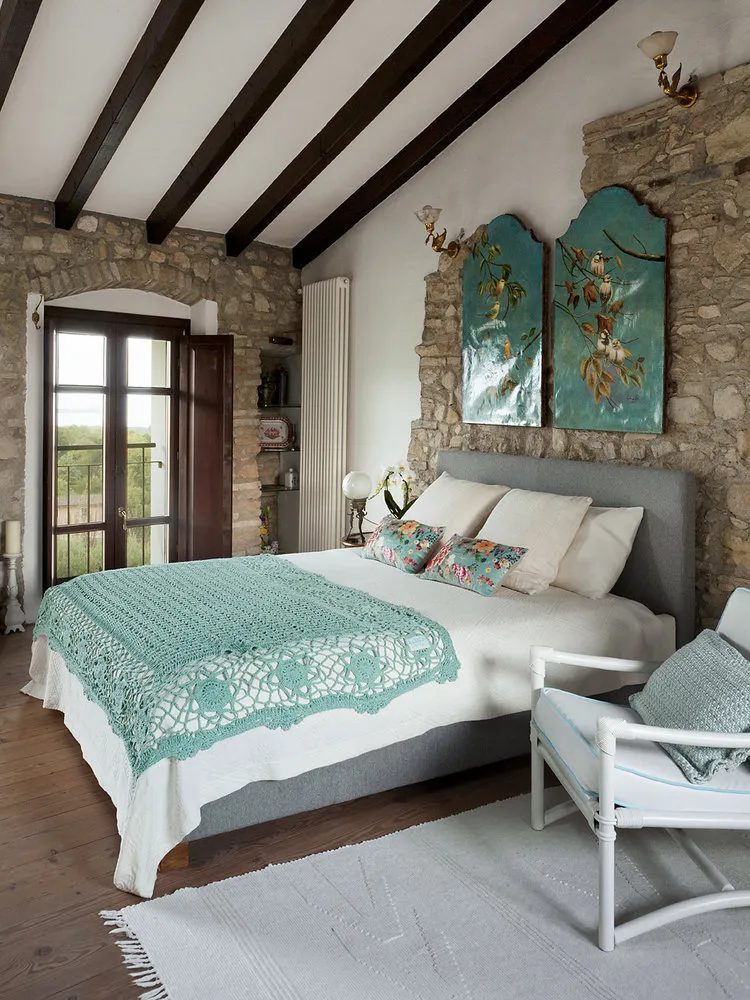
Design: Zhenya Zhedanova
The basis of these decorative tiles is a slice of natural stone (e.g., slate) and glass fiber fabric. These models can have minimal thickness and a convex or rough texture, perfect for spacious loft zones, balconies, or attics. The pattern of the material is created by nature and is always original.
Textile and Leather Decorative Panels
Textile and leather wall panels in a spacious room are also associated with luxury. They are used to create an accent in the interior, decorate a lounge zone, and provide thermal insulation.
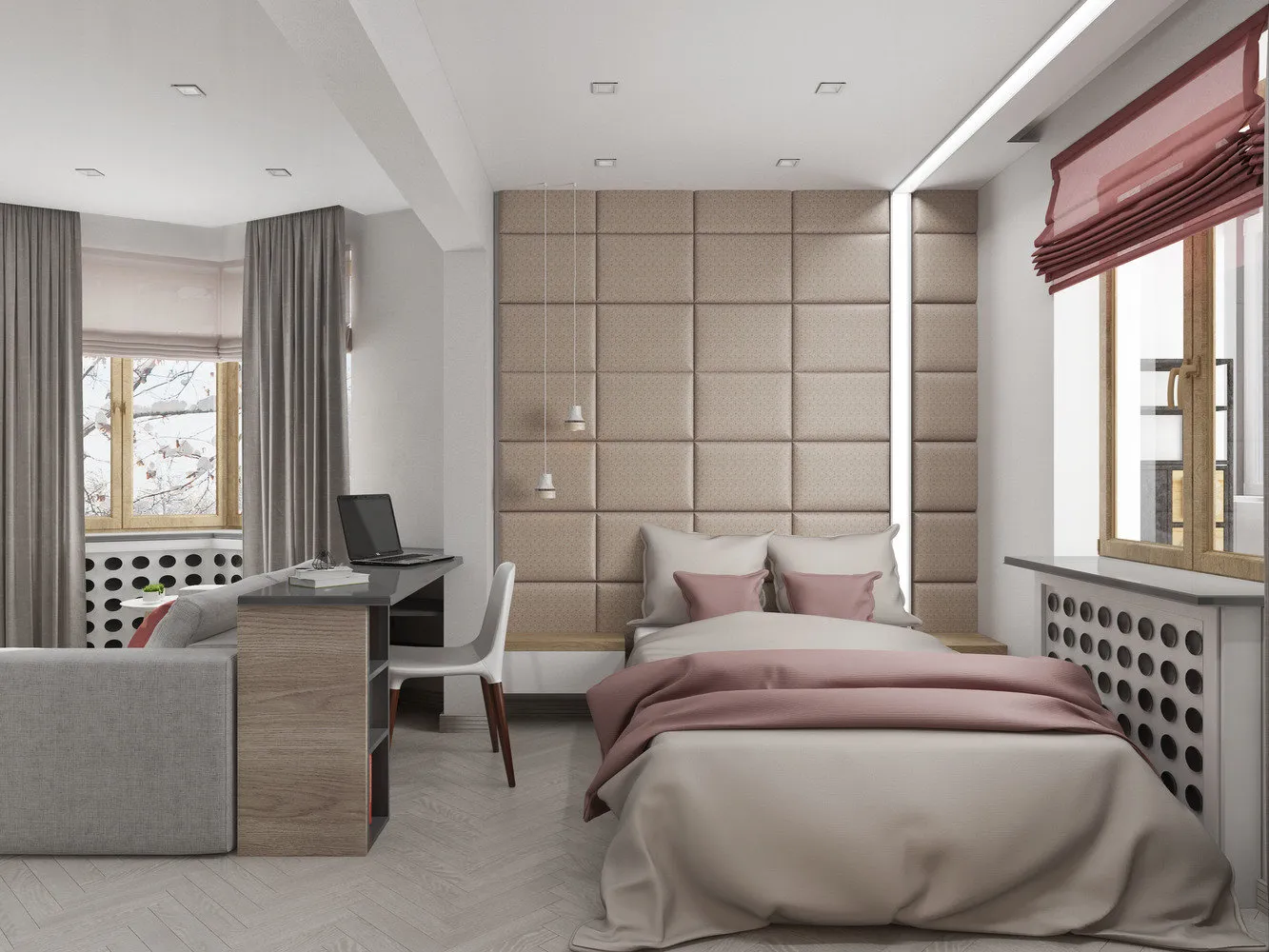
Design: Eugenia Ermolaeva, Studio EEDS
Different variants of these wall tiles are completely unique. There are hundreds of their variations:
- made from suede, natural leather, or felt
- with different fillers – soft foam or moderately firm polyurethane foam
- with a relief surface, "carriage upholstery"
- with photo printing.
Leather finishing, decorated in the carriage style, will complement an expensive classical bedroom or living room setting. In addition, various fabric tiles in the right shape, glossy and textured, are suitable for interiors in baroque, modern, or techno styles.
CorTen Steel
This material has been used for external works since the 1960s, and in recent years also for interior finishing.
It is produced in the form of sheets and panels, tiles of the required size can be manufactured for a specific project. For example, to create a practical and stylish kitchen apron.
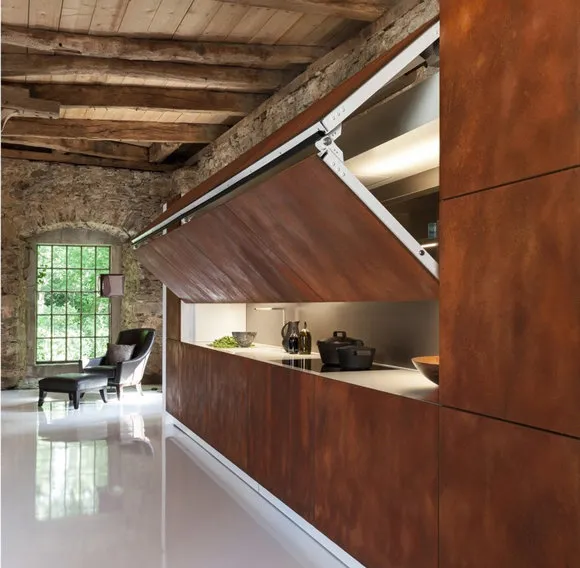
3D Panels
Decorative panels with a volumetric pattern are a separate group of finishing panels made by combining different materials.
The basis of such tiles is gypsum, metal, wood, or wooden materials. For example, the base layer can be made from gypsum with metal inserts, and in the middle of the product – a relief wooden plate. The outer surface of volumetric panels is covered with veneer, PVC film, or paint.
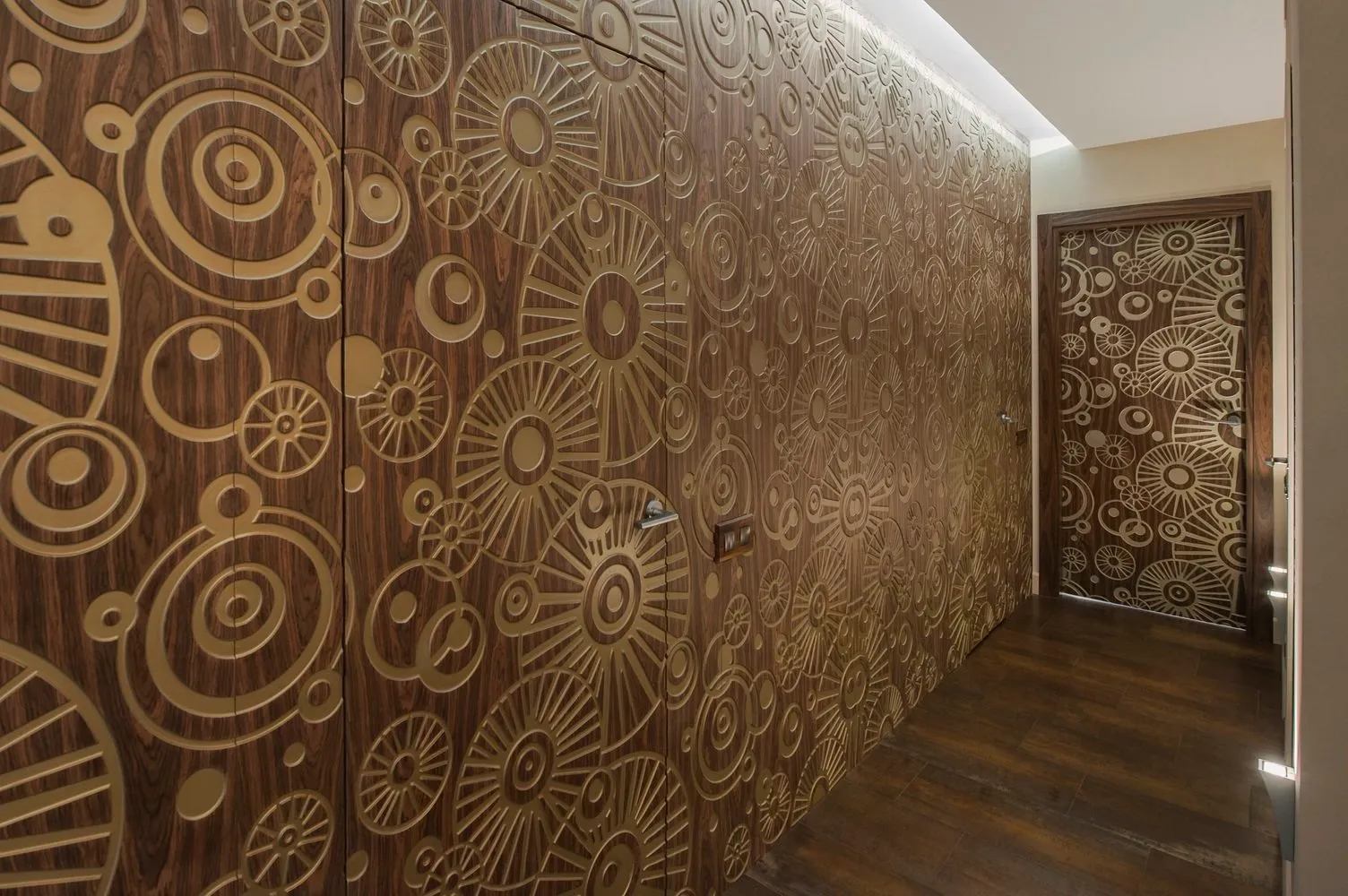
Design: Inna Velichko
In the production of 3D panels, more rare materials can also be used – reed, bamboo, or straw, and such unique tiles should only be selected for a specific design project.
In any case, volumetric finishing ensures good sound insulation and helps to define zones in large rooms.
Example of Use of Decorative Panels in New Design Projects
- Finishing the Lower Part of a Wall
This method can be used to create practical finishing in a hallway, entrance hall, or English living room. Plastic strip panels are used in hallways. For a room, paneling made from solid wood or wood materials can be selected.
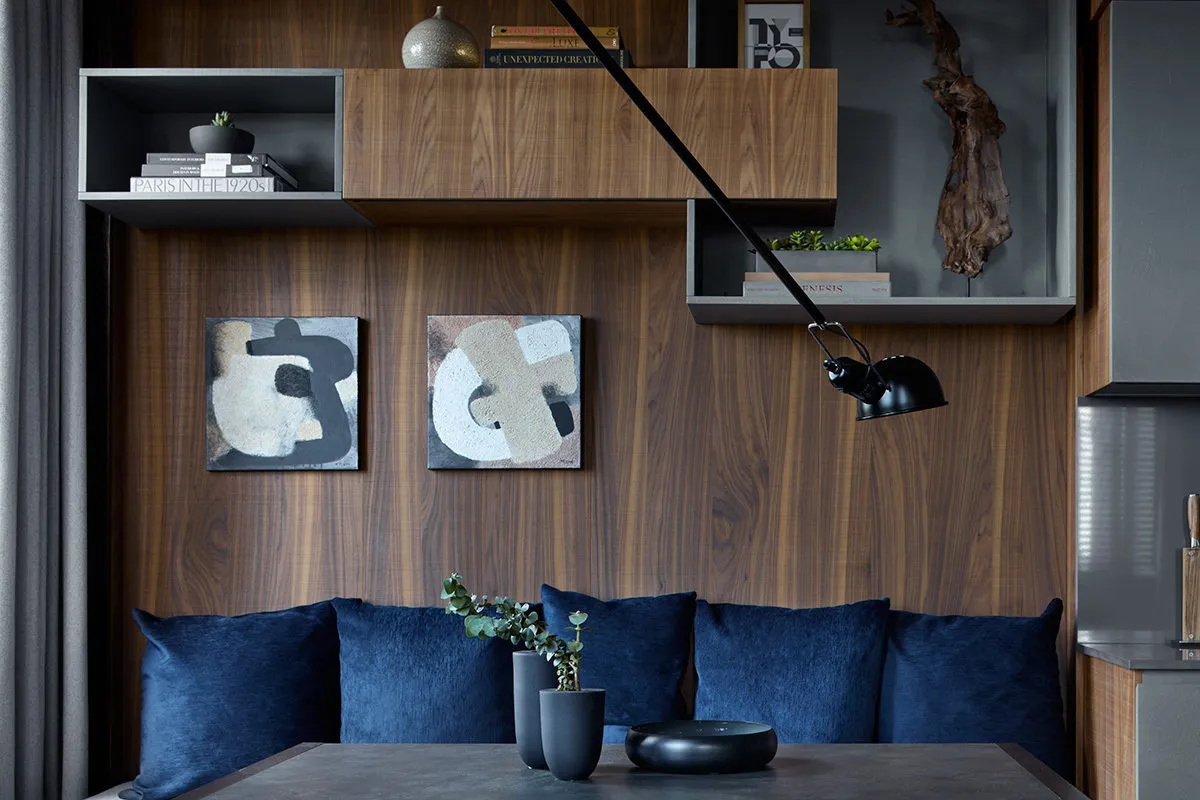
Design: Anastasia Rykova and Anastasia Bozhinskaya, S-Style Studio
Expensive and stylish is the combination of wooden strips and sand-colored, beige, or green wallpapers.
- Combination of Several Types of Panels in One Room
In classic and neoclassical interiors, wood and leather can be combined. In the finishing of a large country house in minimalist style, architect Shamсудин Kerimov harmoniously combined artificial stone, MDF, and soft textile panels. In this case, the colors of the materials blend harmoniously.
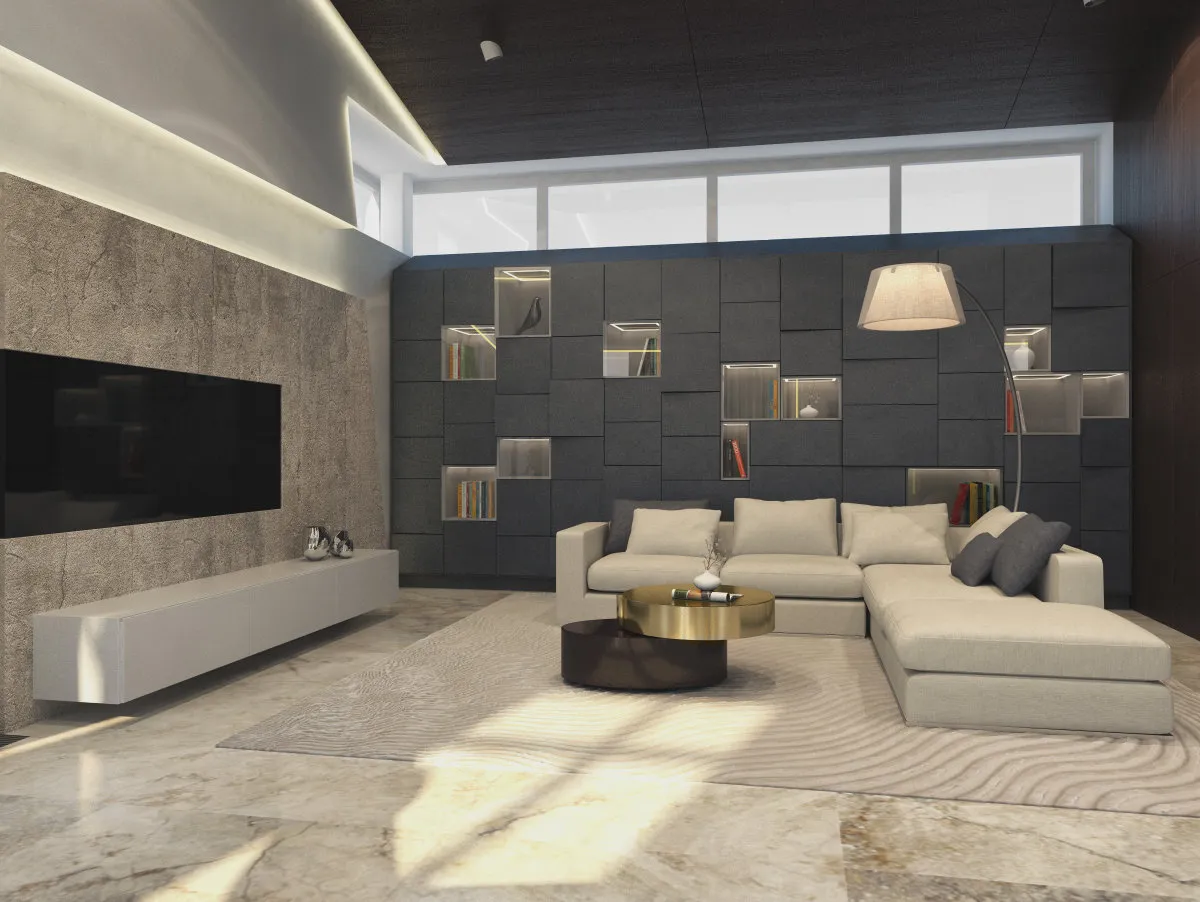
Design: Shamсудin Kerimov
- Accents from Tile Panels
Soft panels are often used in a bedroom to finish the wall near the head of the bed. Stylish accents in an interior can also be created with bamboo or glass panels.
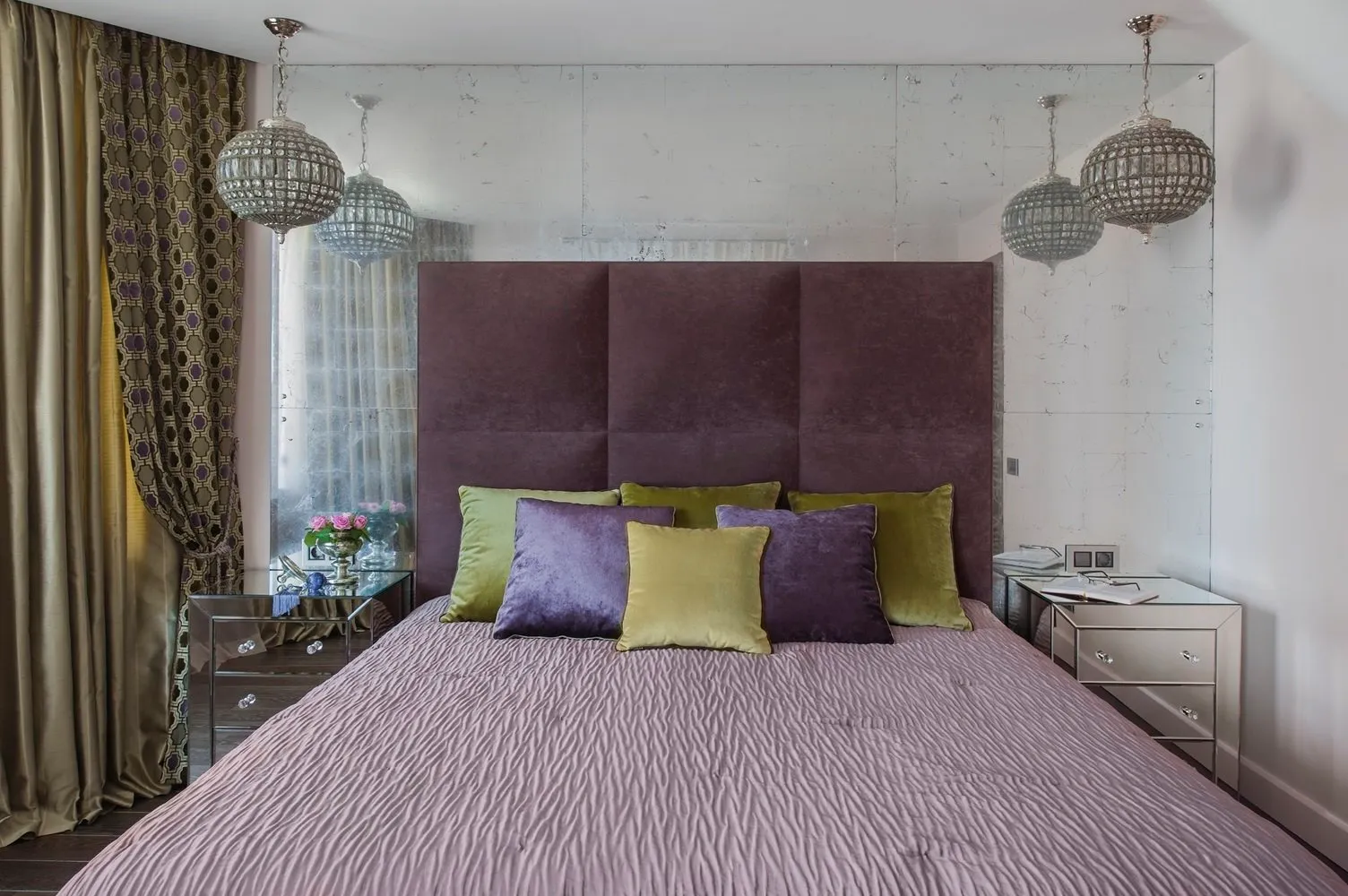
Design: Inna Velichko
- A Picture Made from One or Several Gypsum Panels
- Laying Plastic Panels to Look Like Brick
- Finishing the Ceiling with Sheet Panels
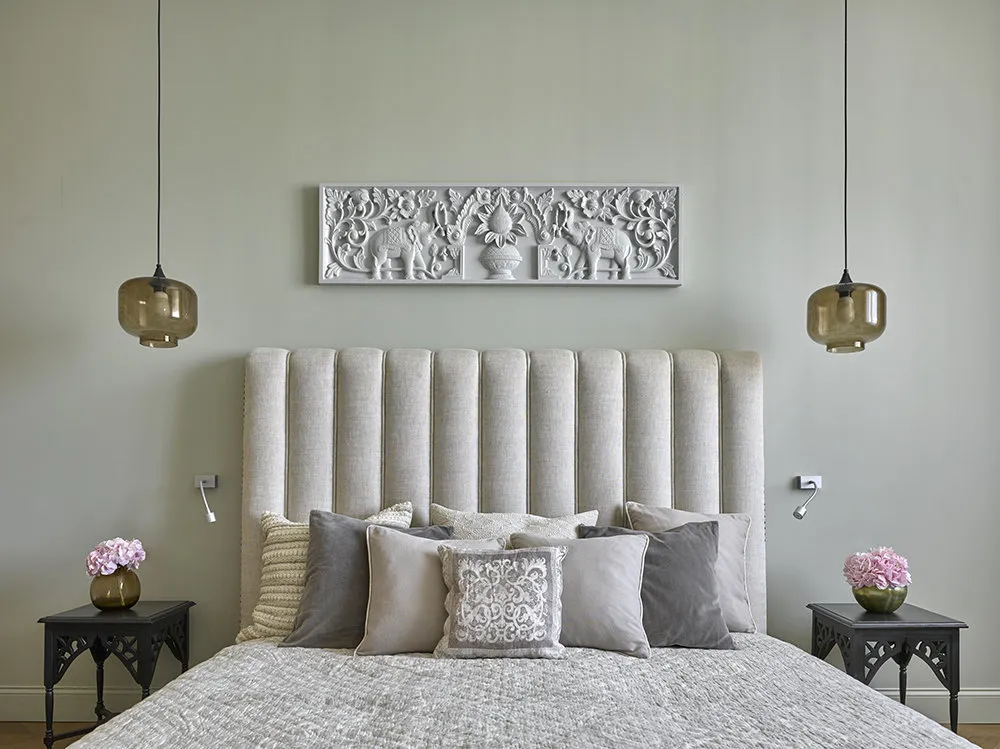
Design: Lavka-design
Main Points About Material and Color Selection
For leveling walls in large commercial spaces, budget gypsum board sheets (GKL) are often used. Sheets with an additional vinyl plastic layer replace wallpaper.
There are more than 120 variants of vinyl GKL finishing in monochrome colors and with simple textures. For a restrained office design, you can always select an appropriate design.
More elegant decorative panels for walls solve the design task – they make an interior stylish and practical. But only if color combinations, patterns, or textures are correctly selected.
Wall panels for interior finishing that resemble wood or stone slices with natural tones are always in fashion.
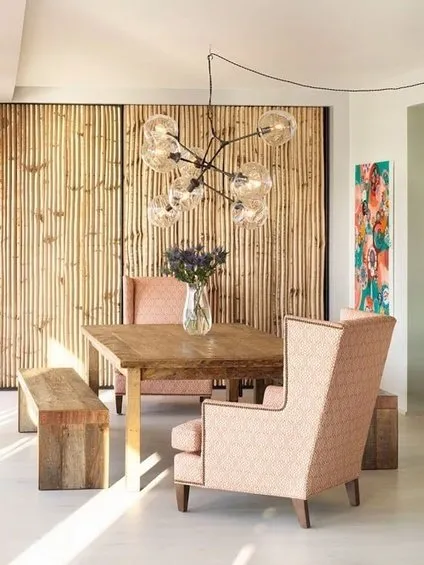
Eclectic Style
The panel material must meet the requirements of the style. For a bedroom decorated according to the rules of classicism or baroque, valuable wood, cork, MDF, or stitched leather will be suitable.
For a modern dining room interior, plastic, glass, volumetric panels with enamel coating are selected. In the working area in loft style, textured tiles with a brick-like appearance can be used. Eco style is enhanced by skinals with images of sea pebbles or grass.
Cold metallic tones of steel panels evoke associations with freedom, spaciousness, and innovation. CorTen sheets harmonize with monochromatic white walls and allow decorating a large room in industrial style, beautifully and tastefully.
Compare different types of wall panels in the interior finishing of country house hallways, living rooms, kitchens, and children's rooms.
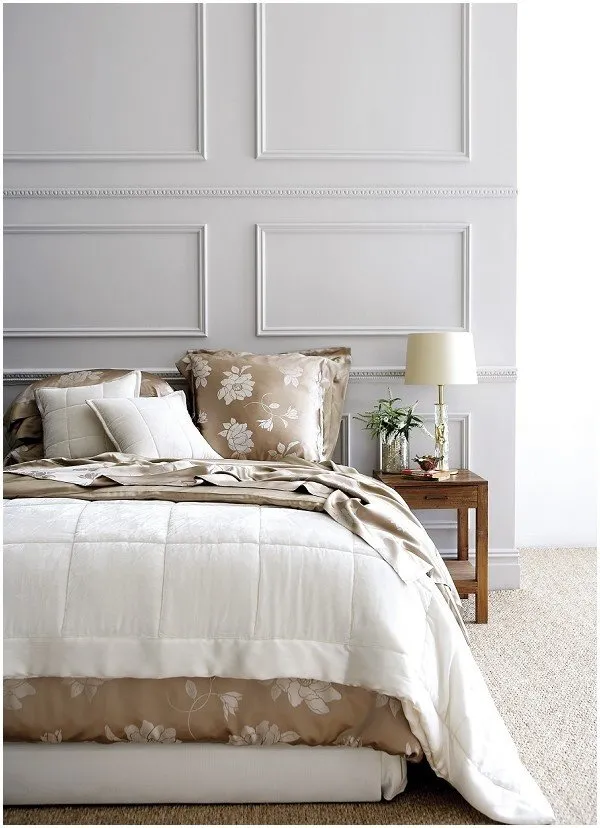
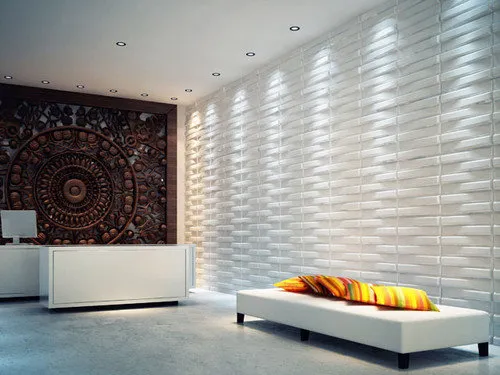
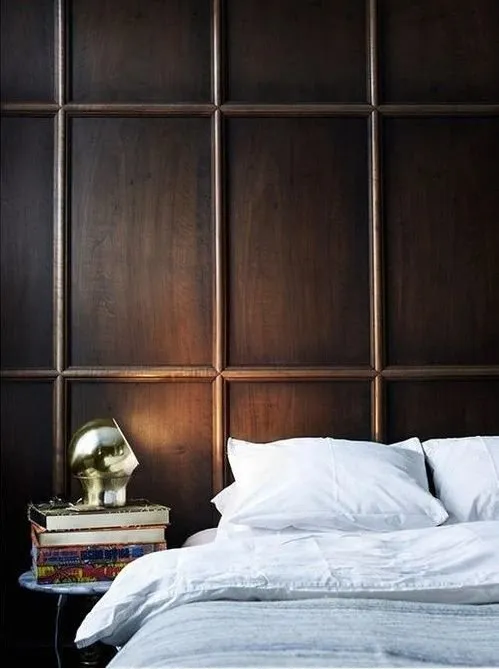
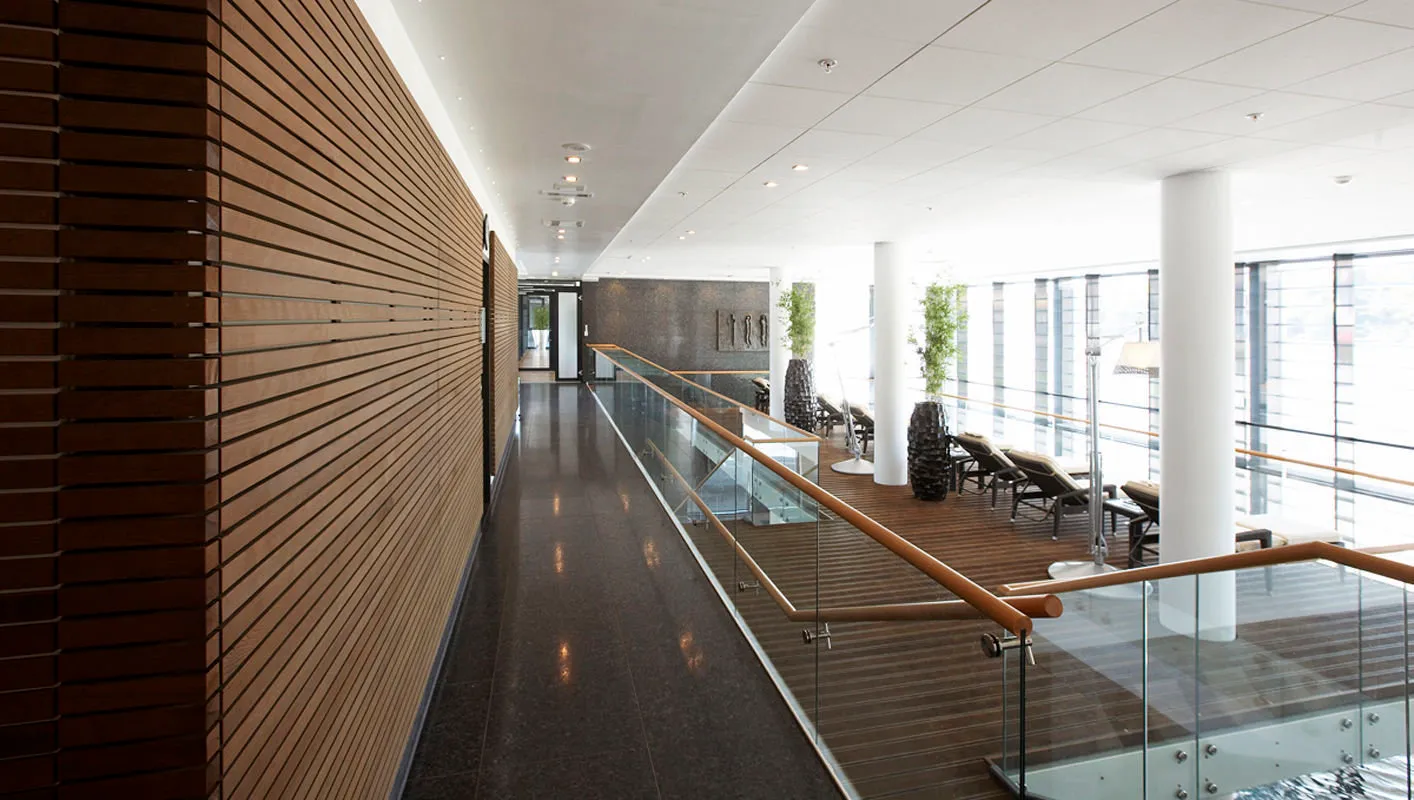
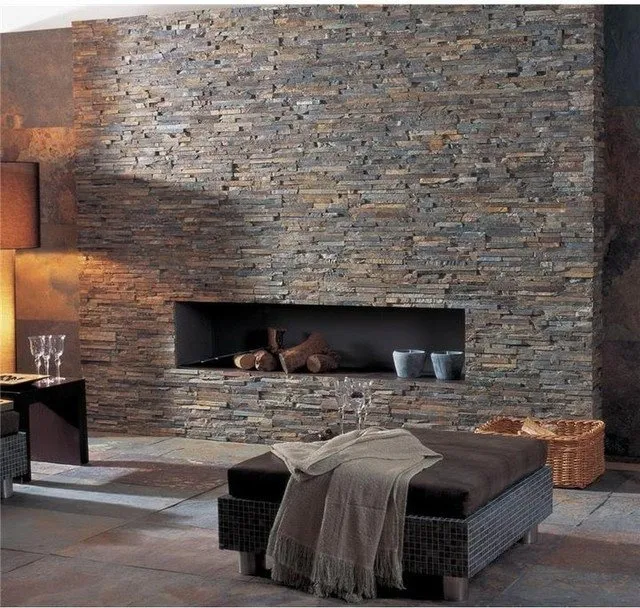
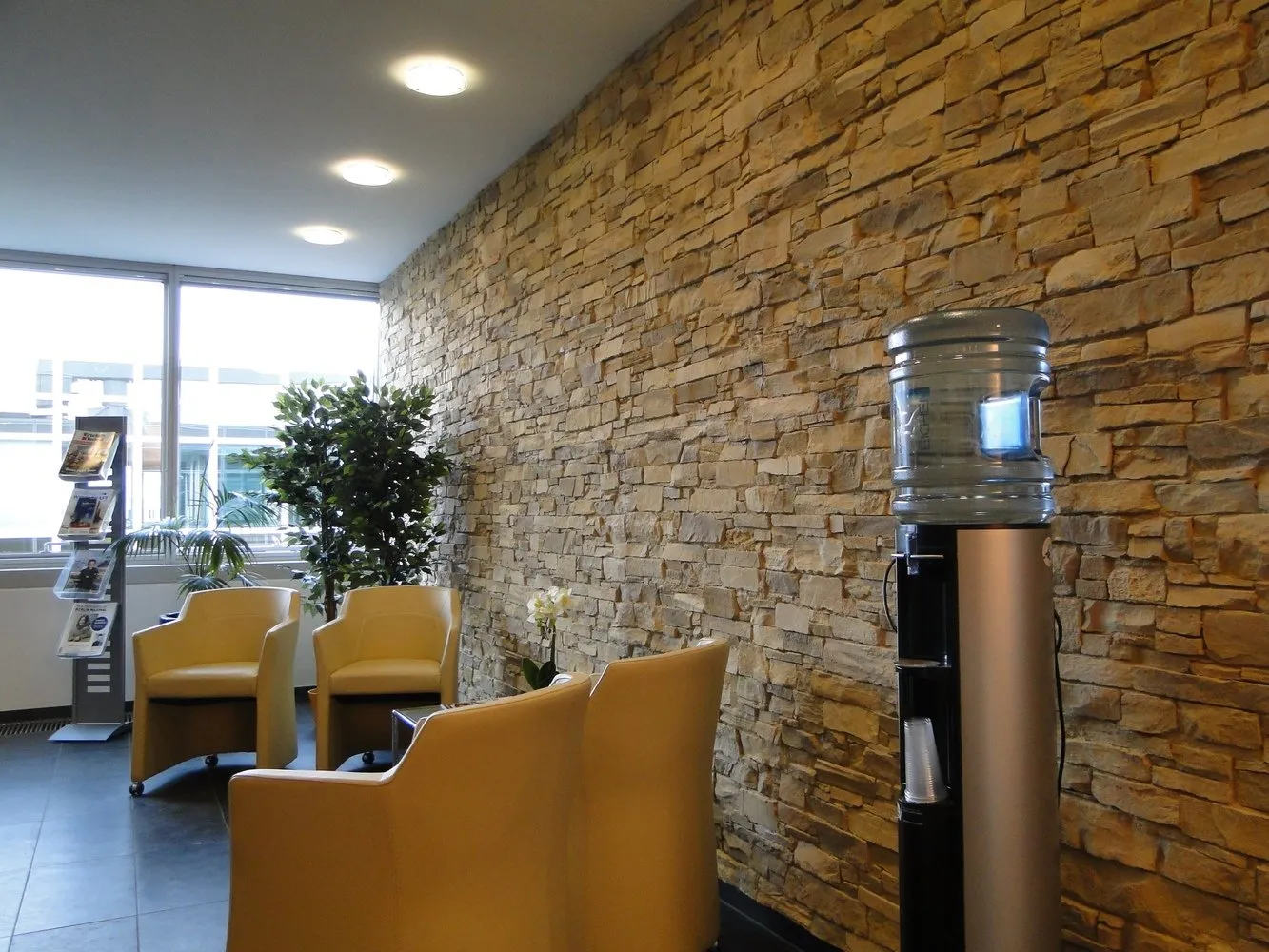
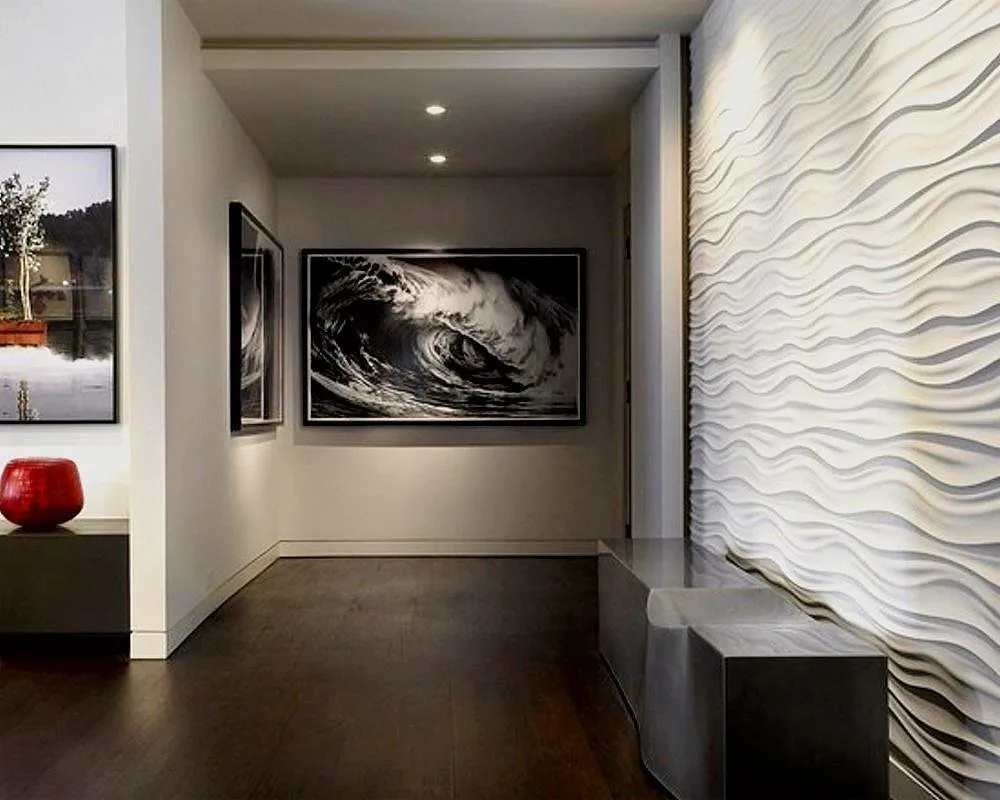
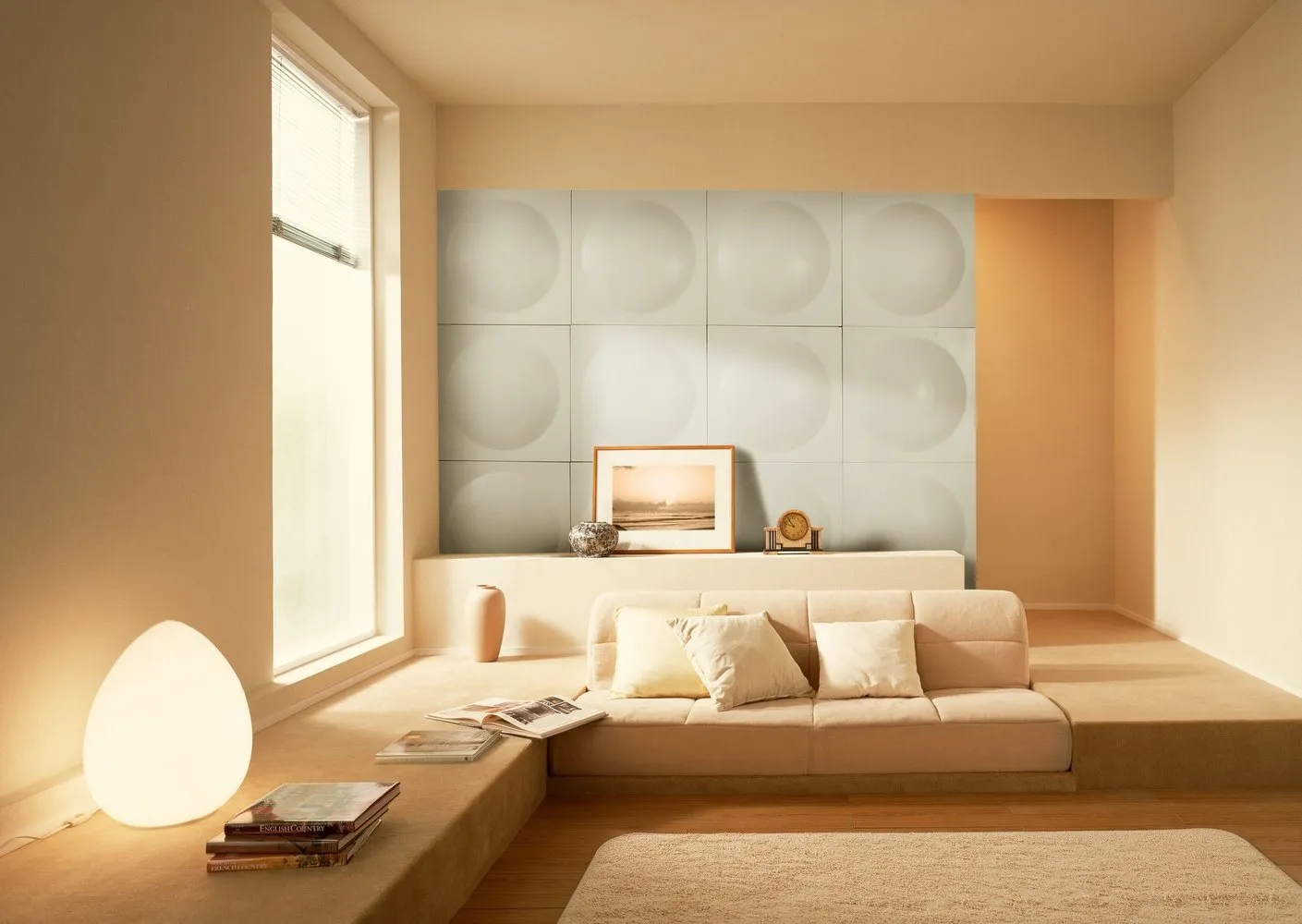
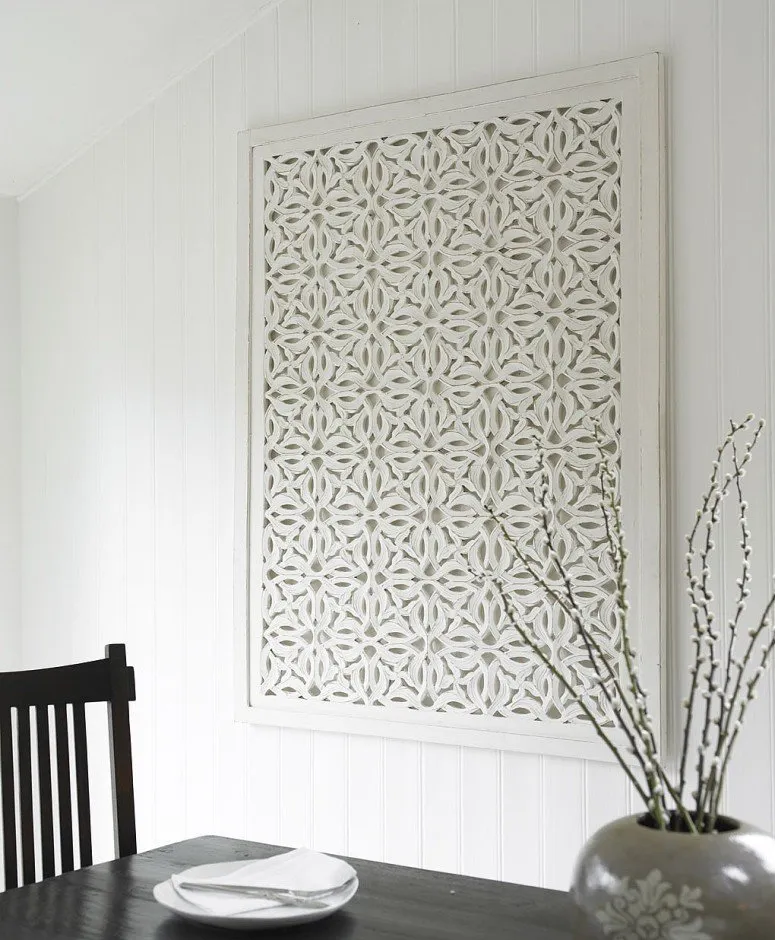
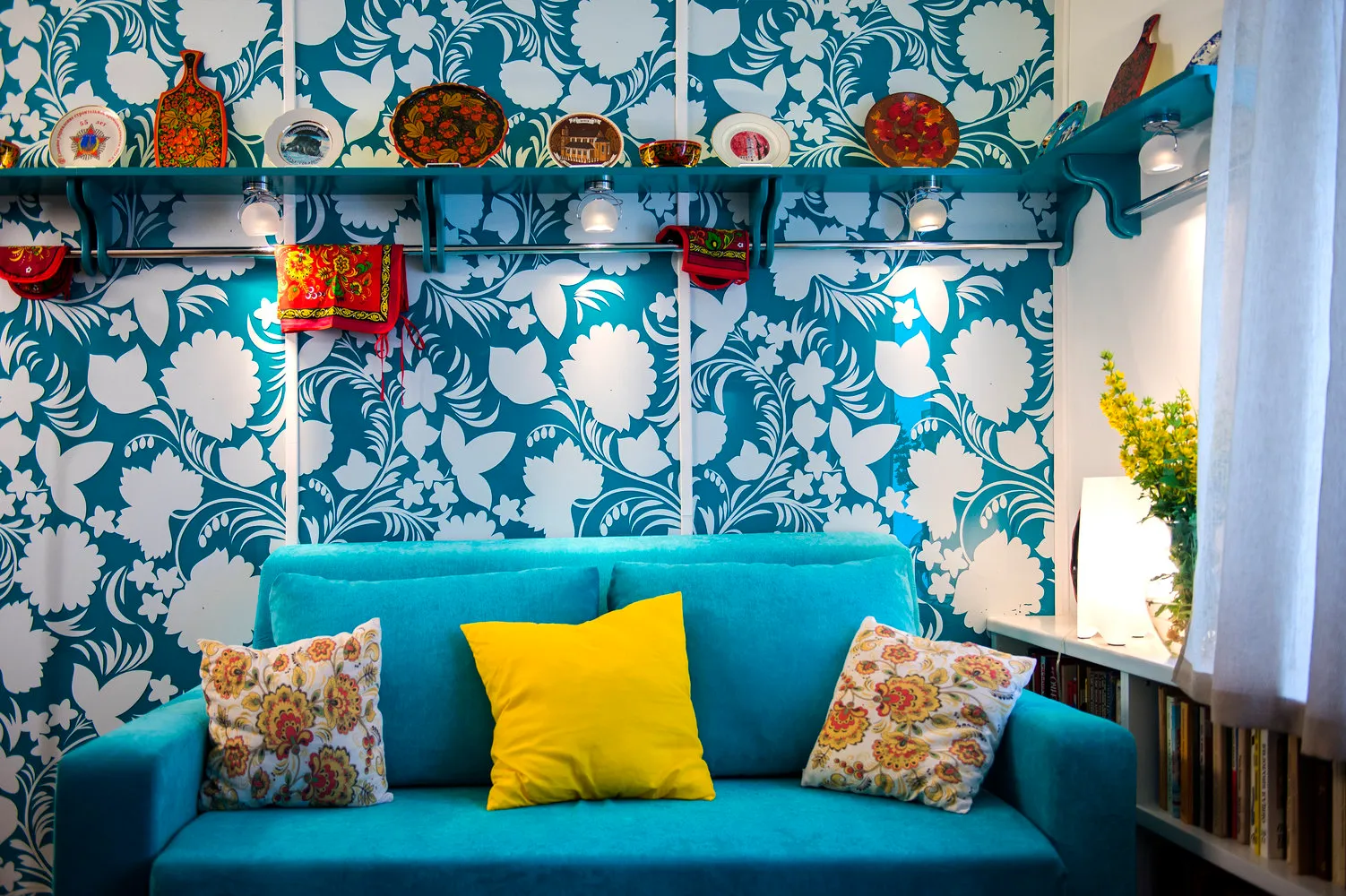
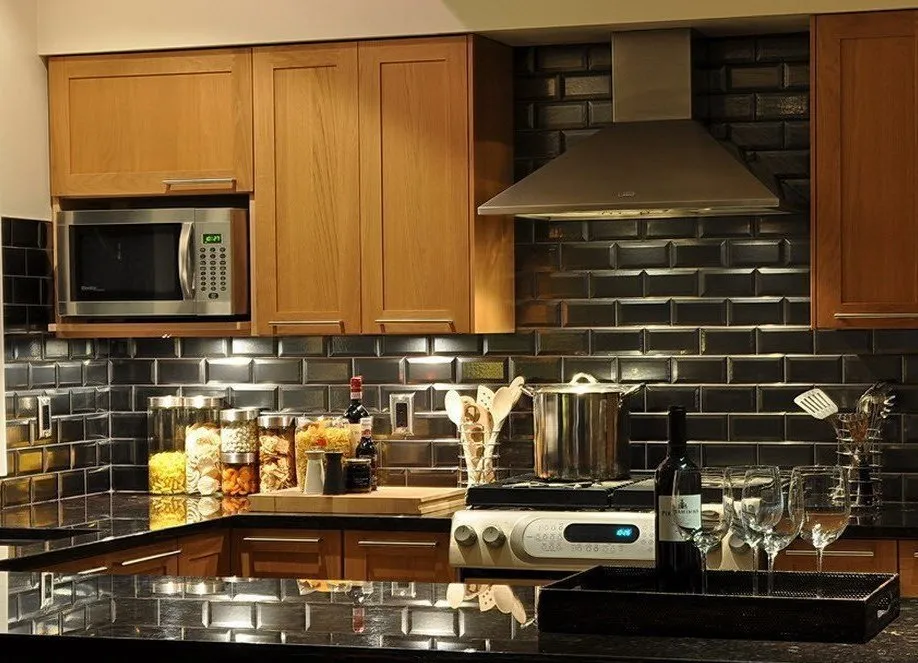
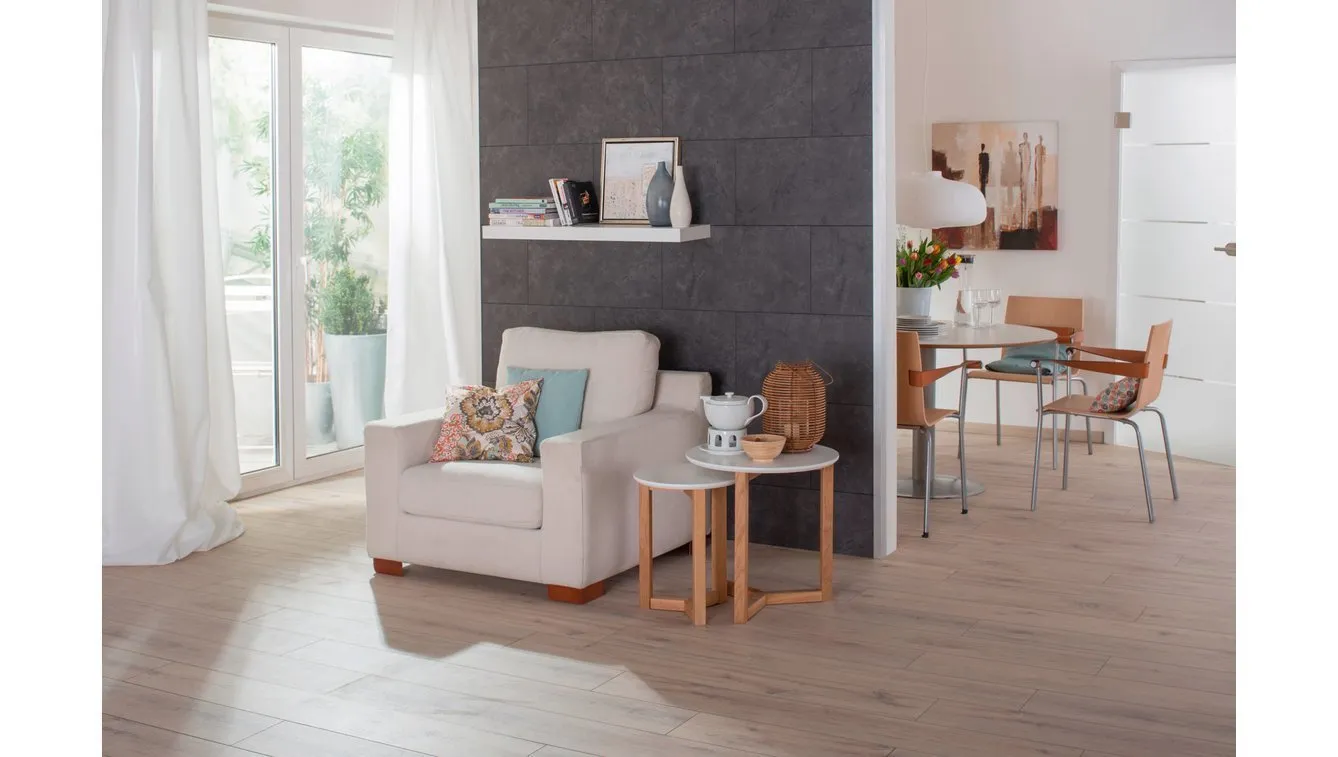
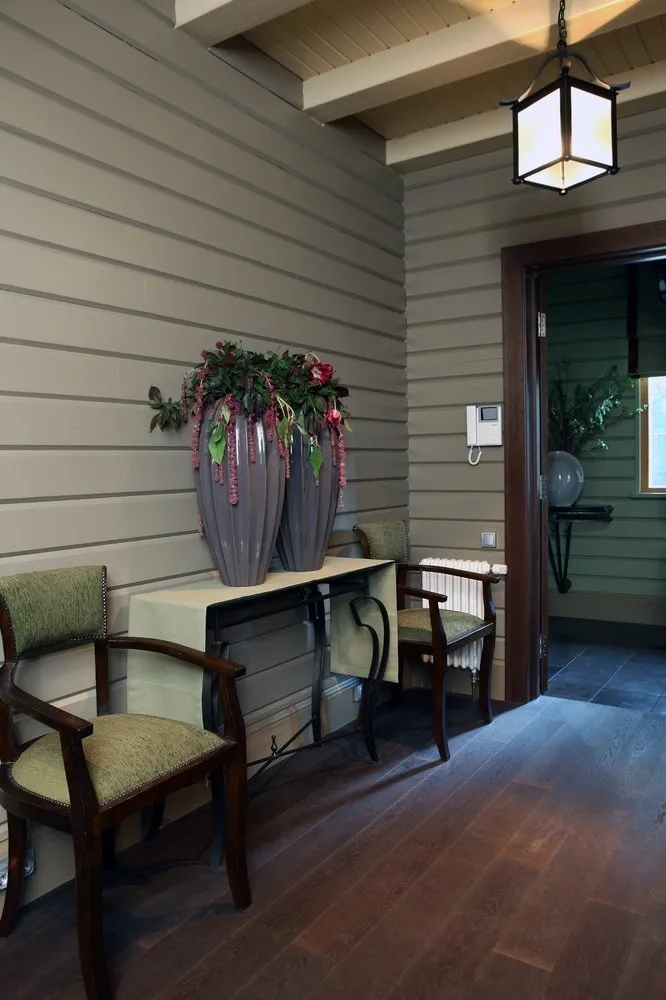
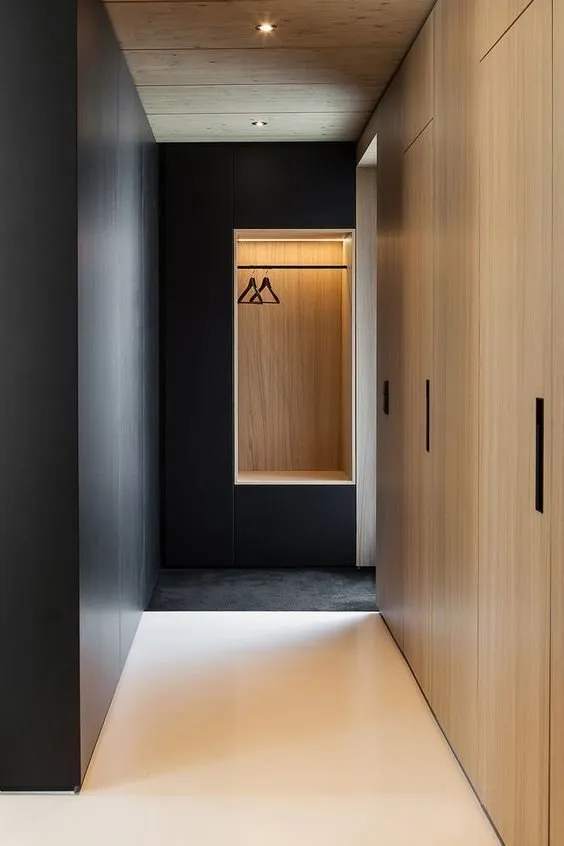
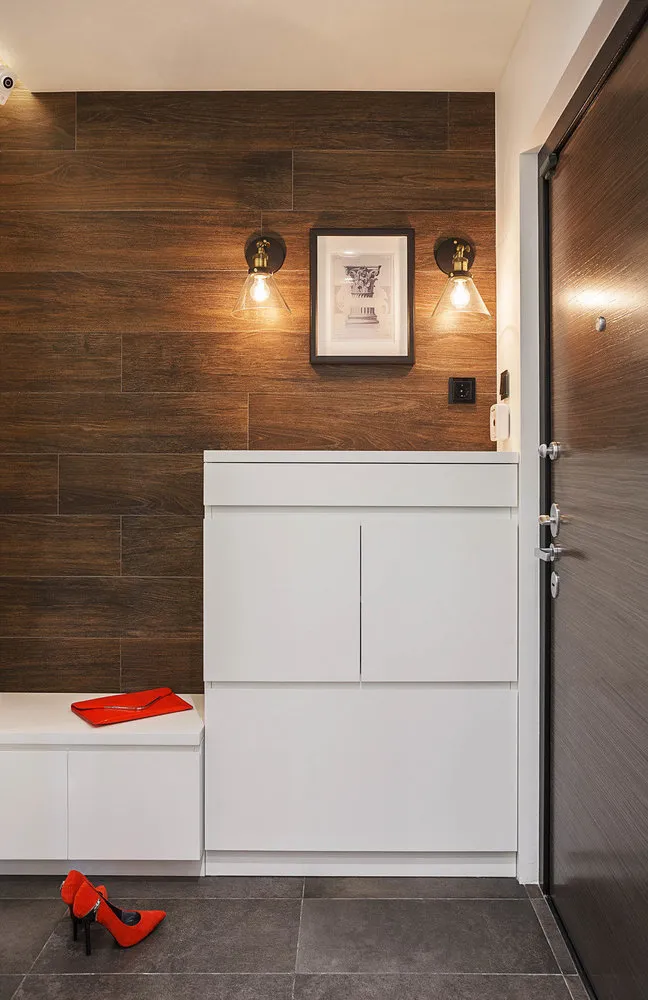

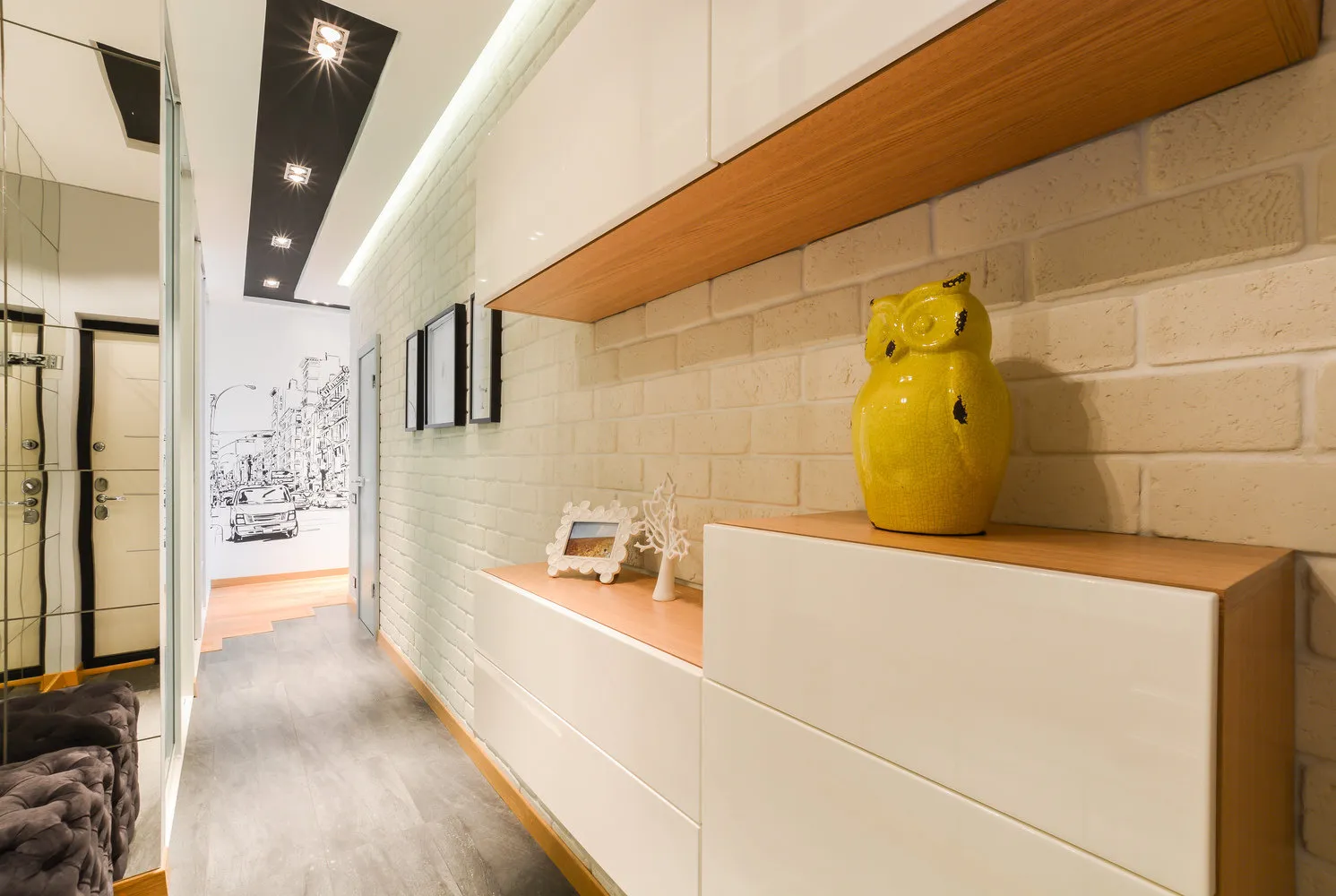
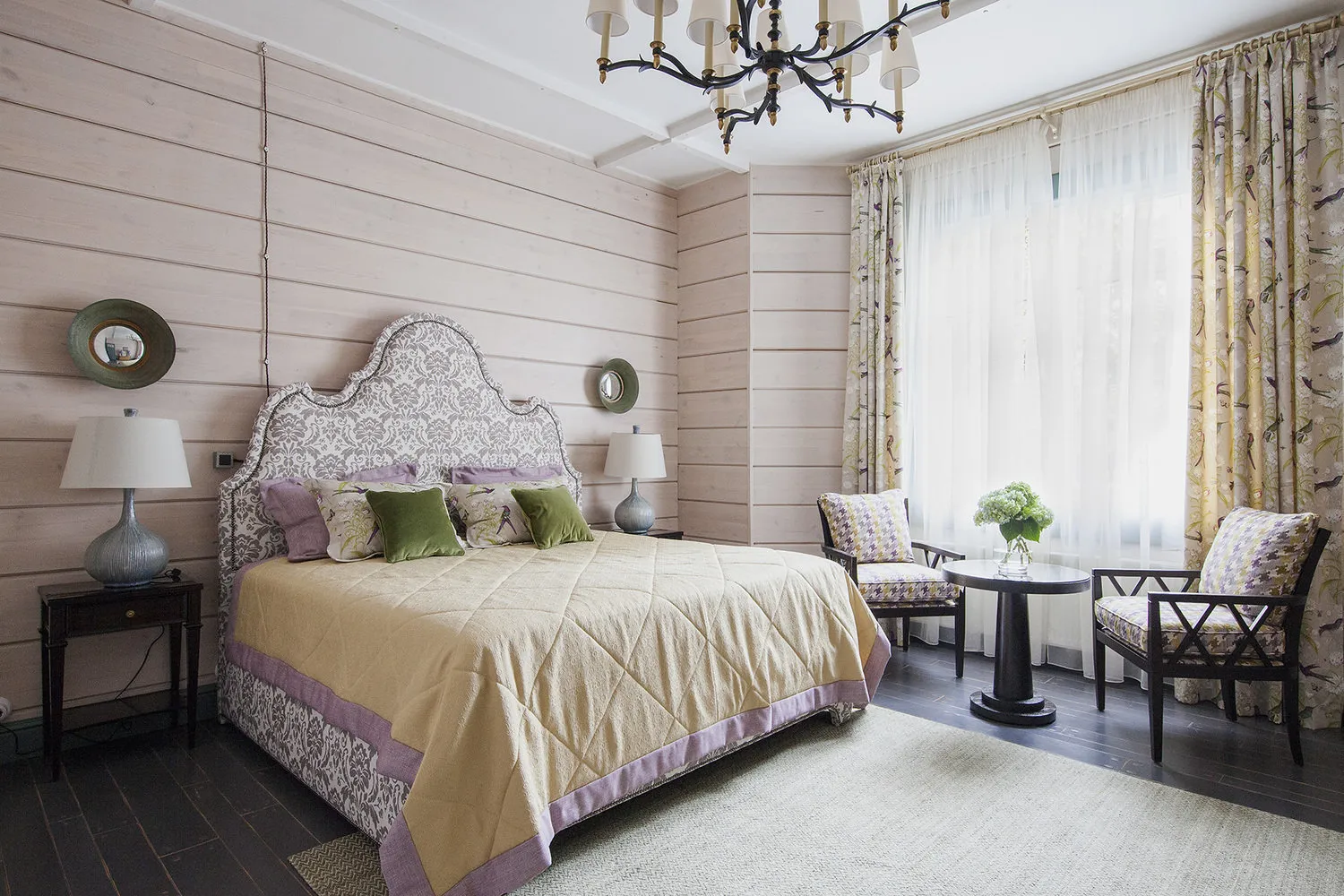
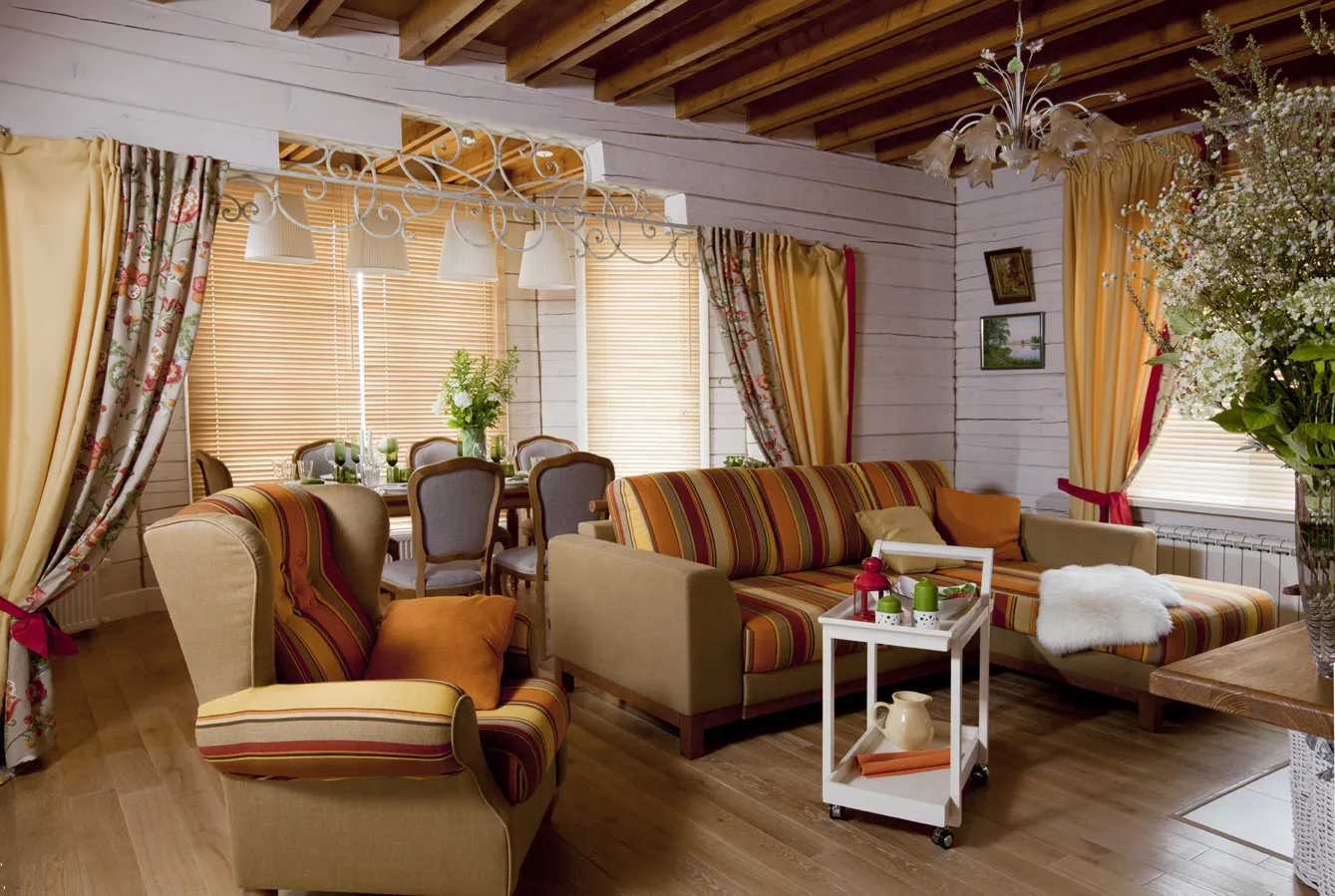
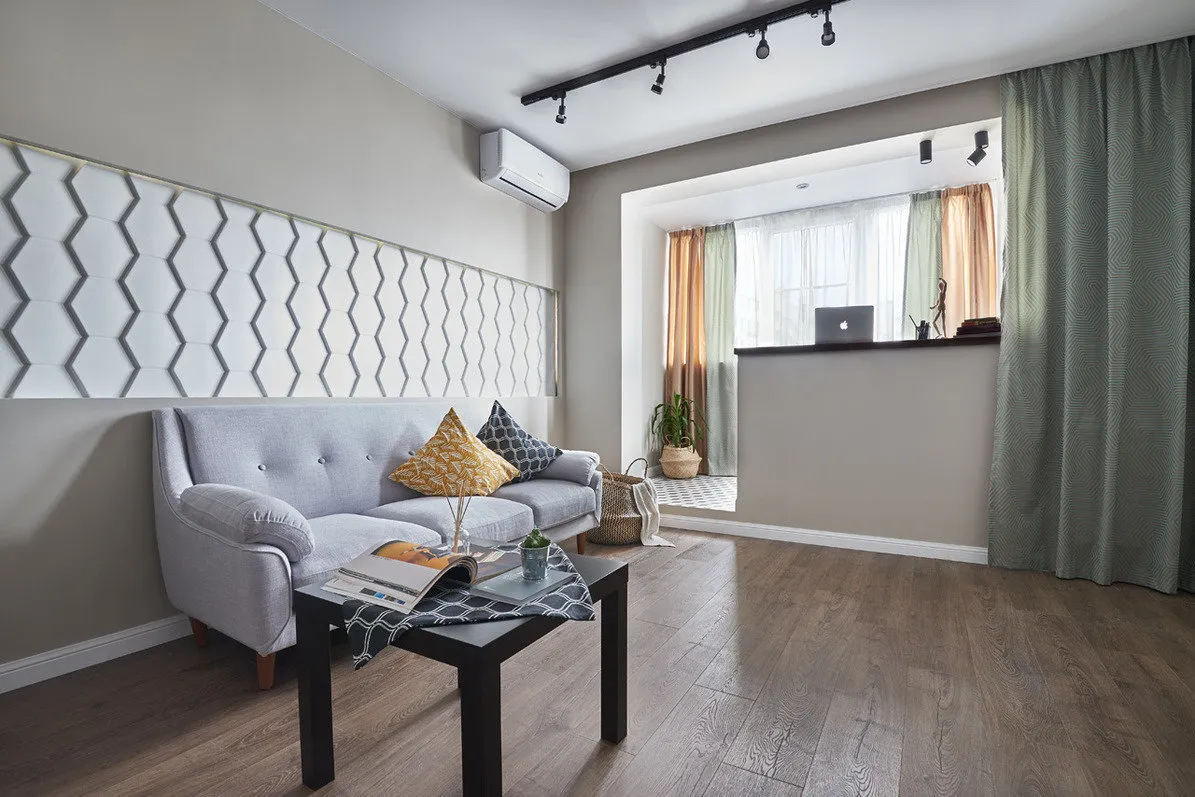
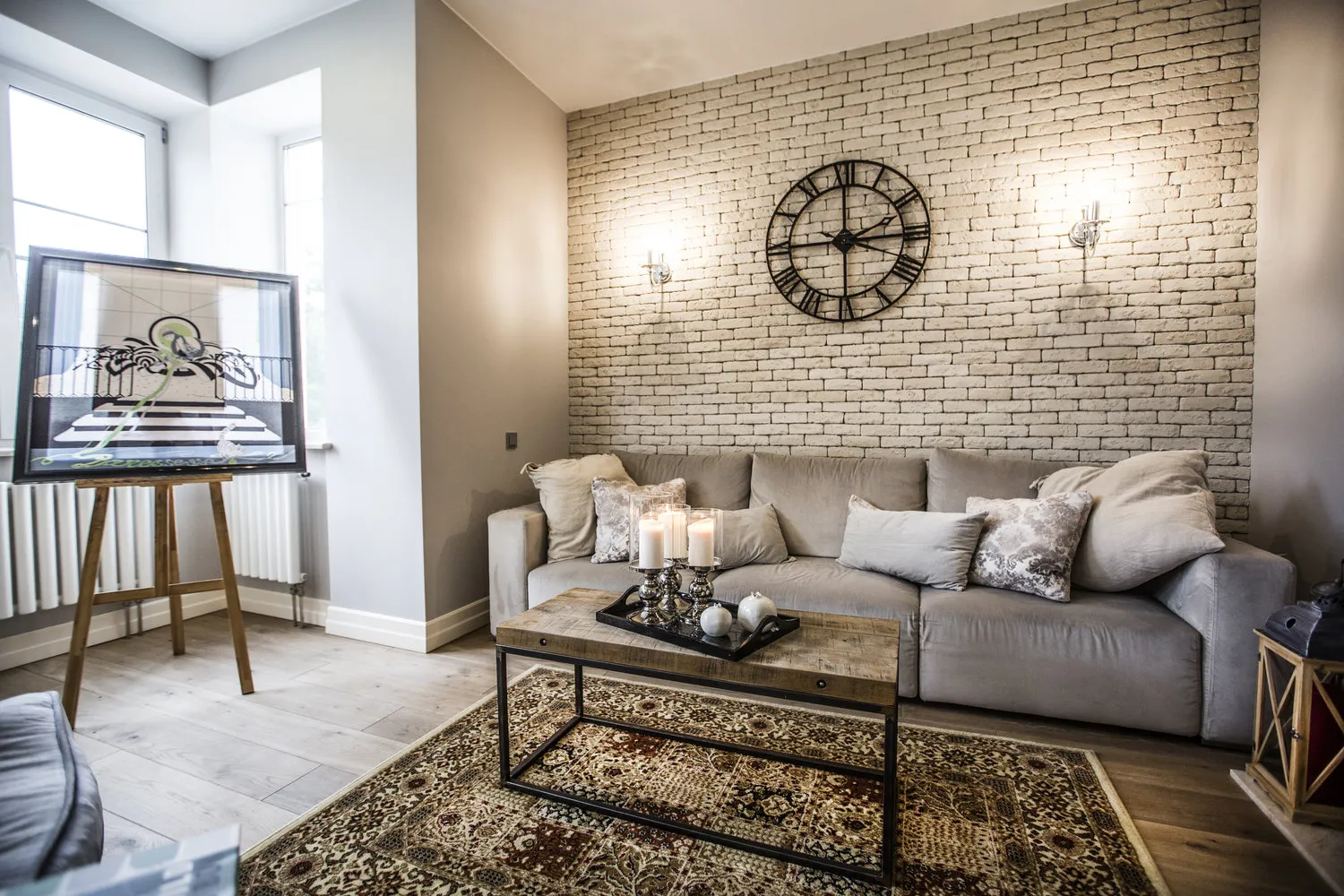

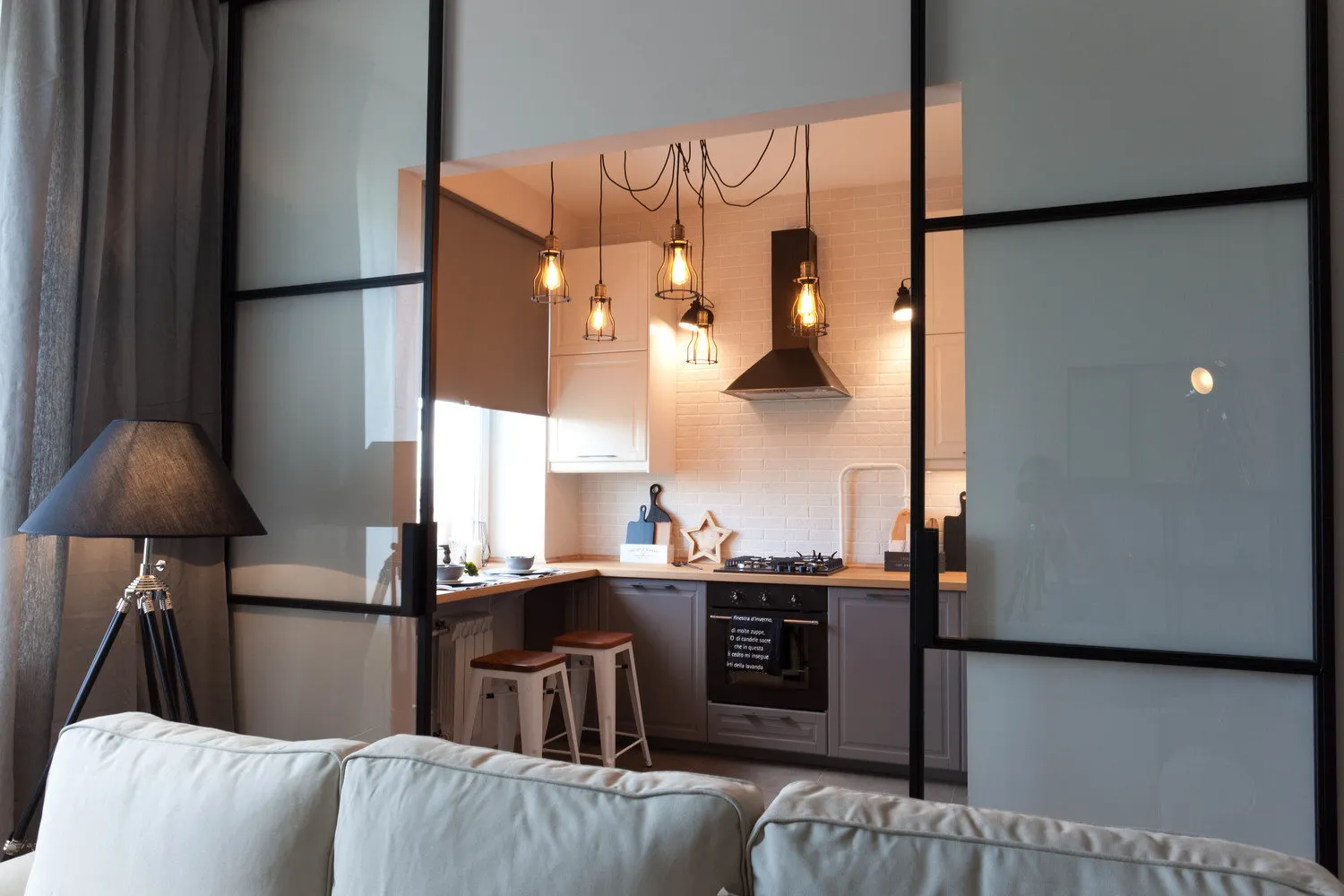
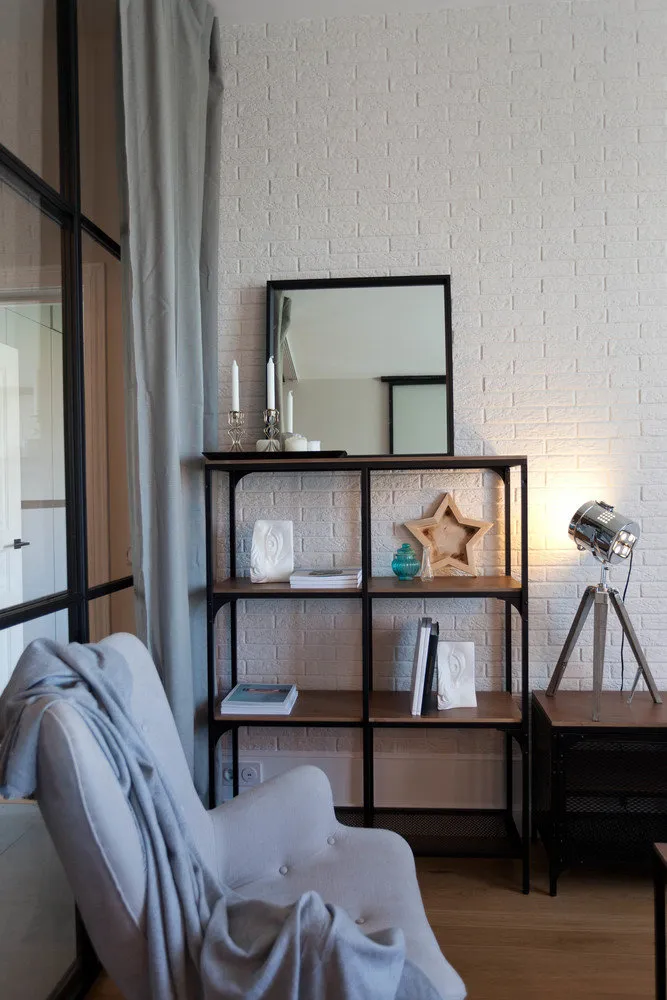
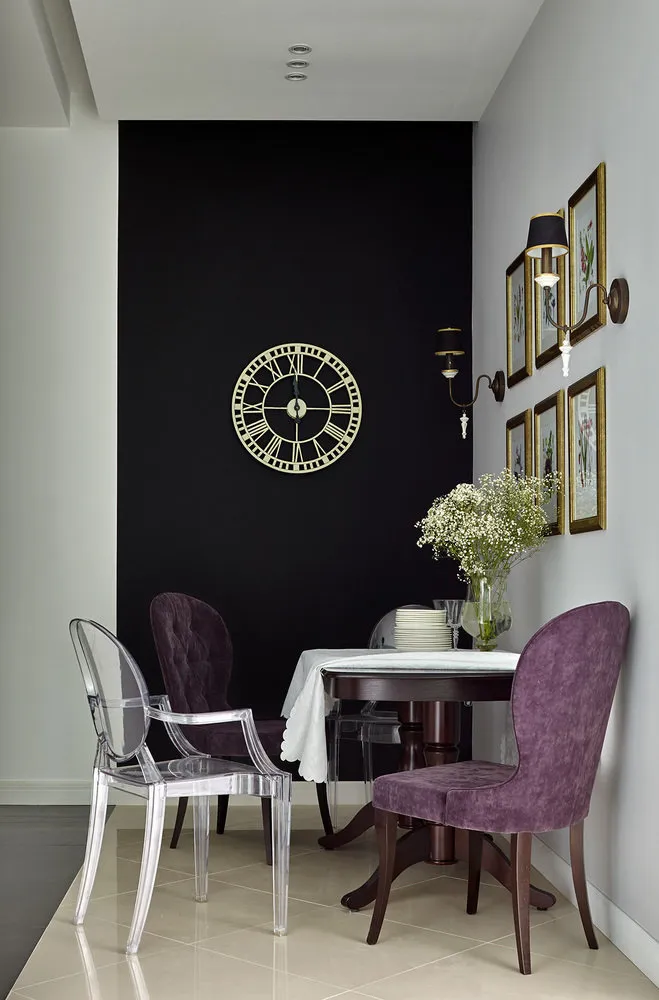
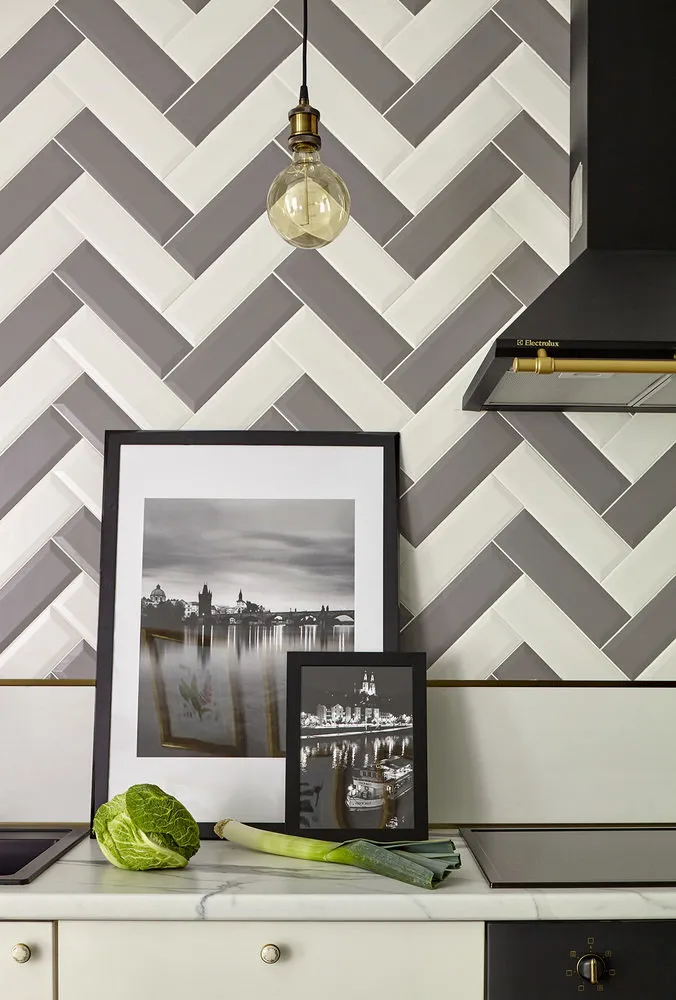
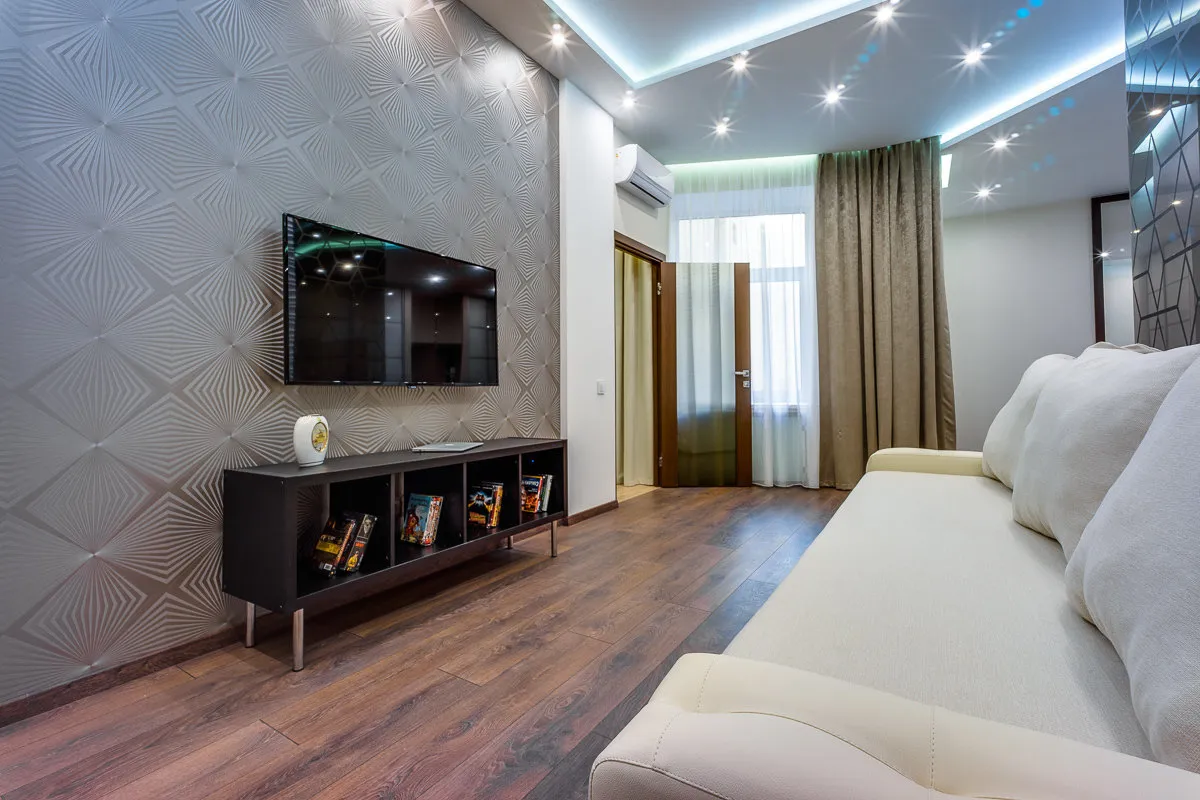
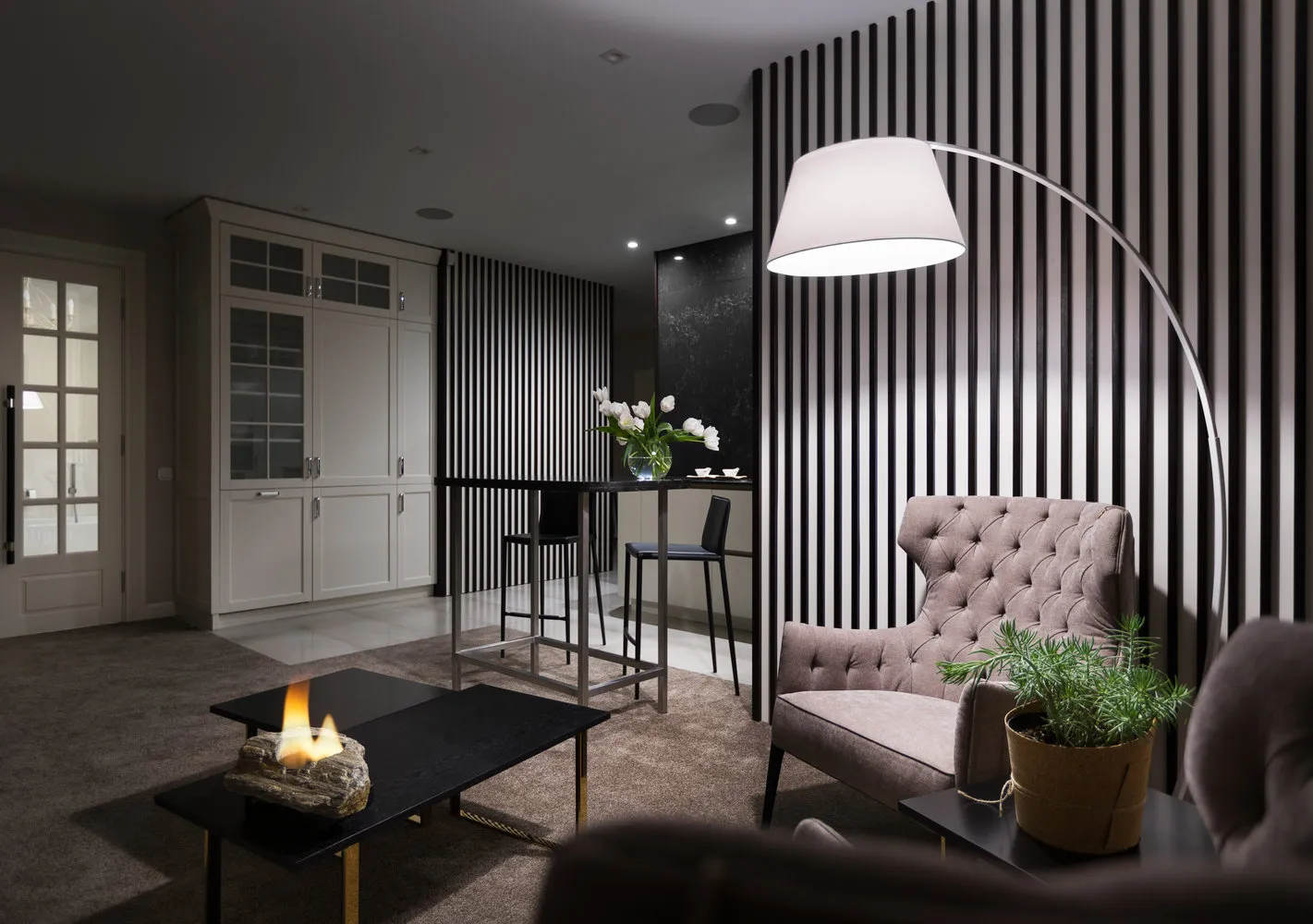
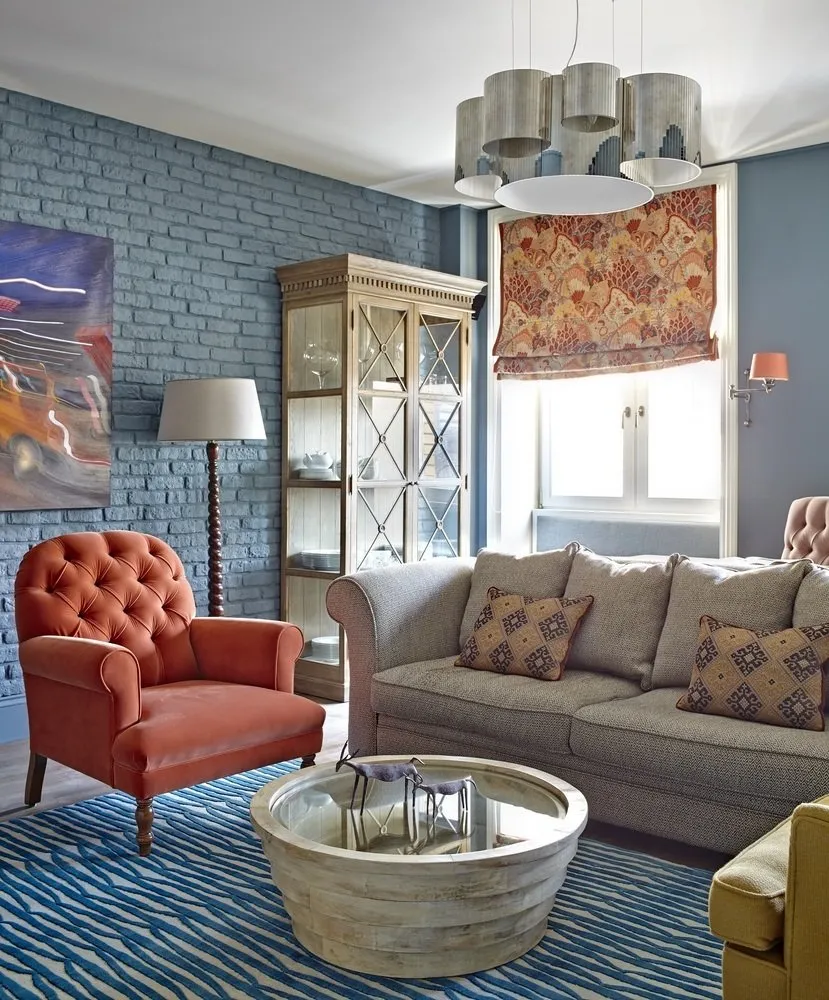
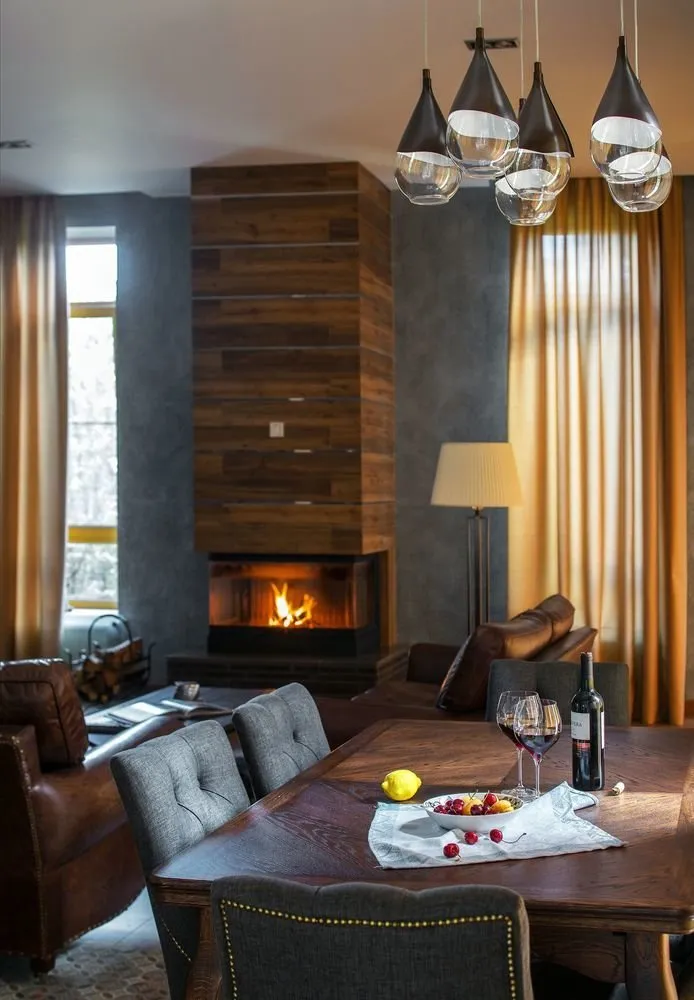
Design: Svetlana Gerasimova
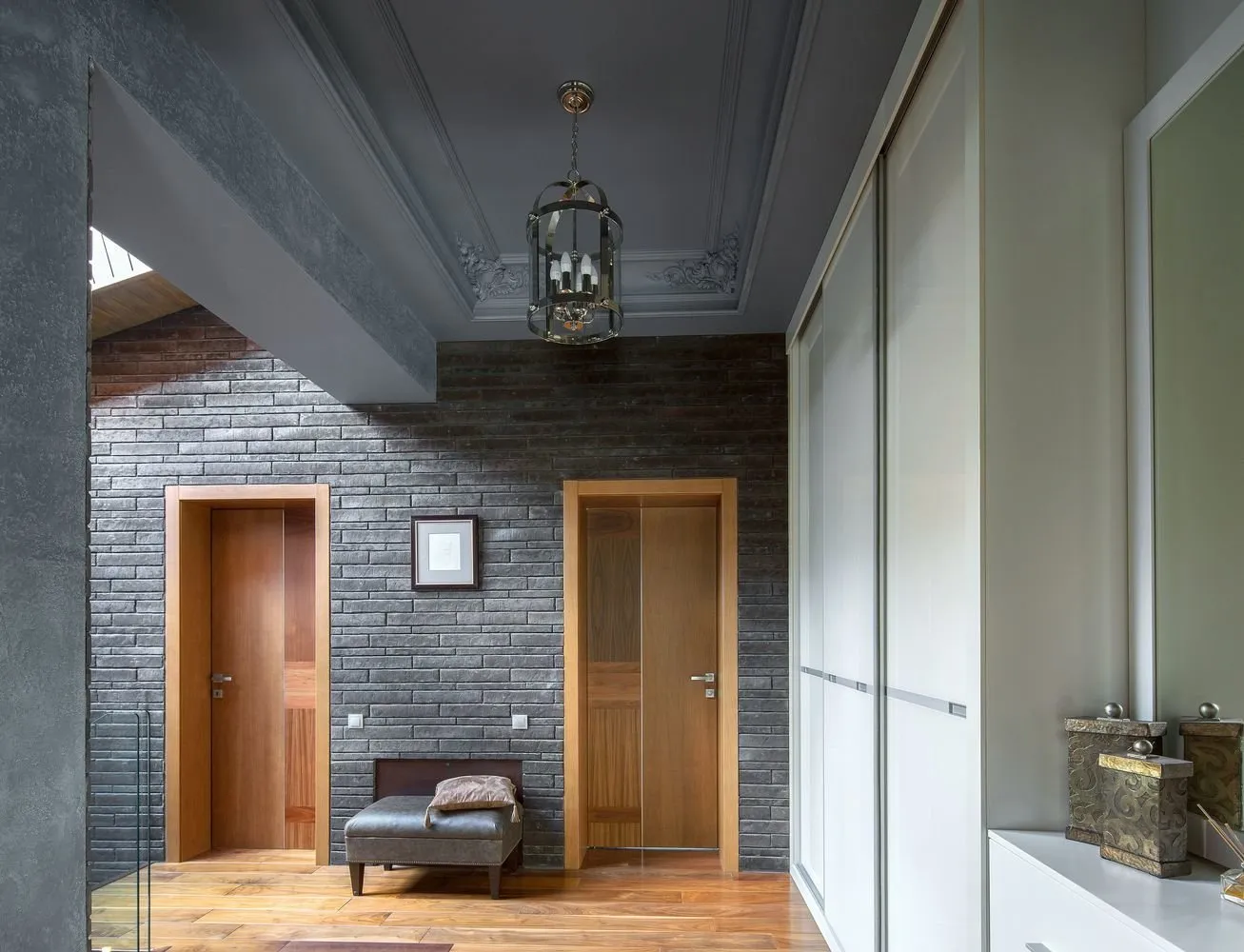
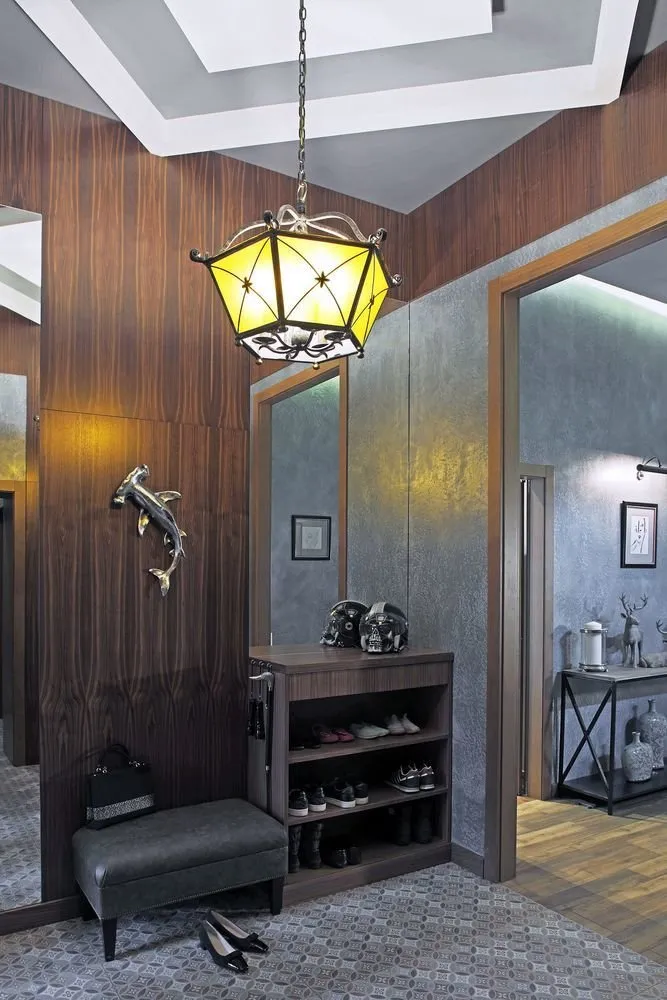
Design: Svetlana Gerasimova
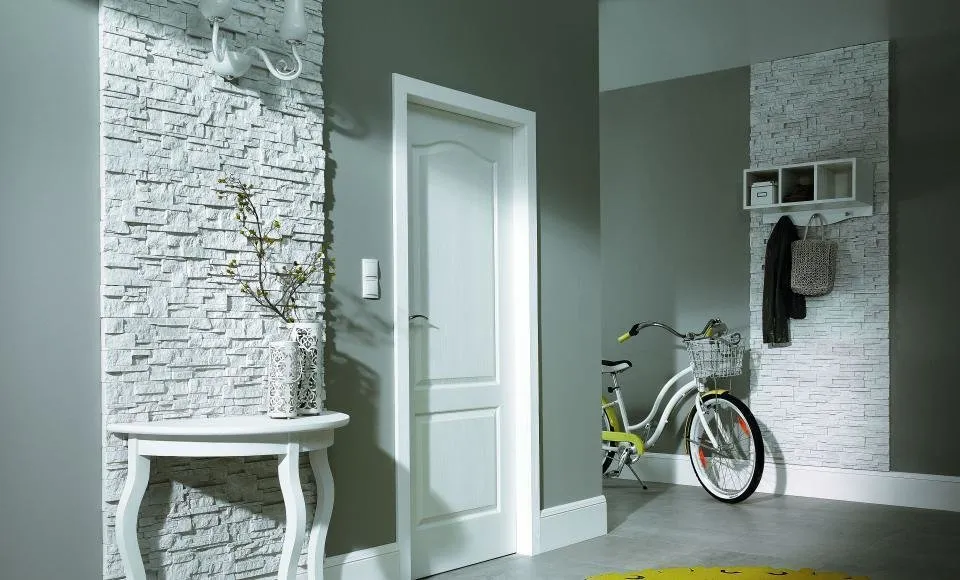
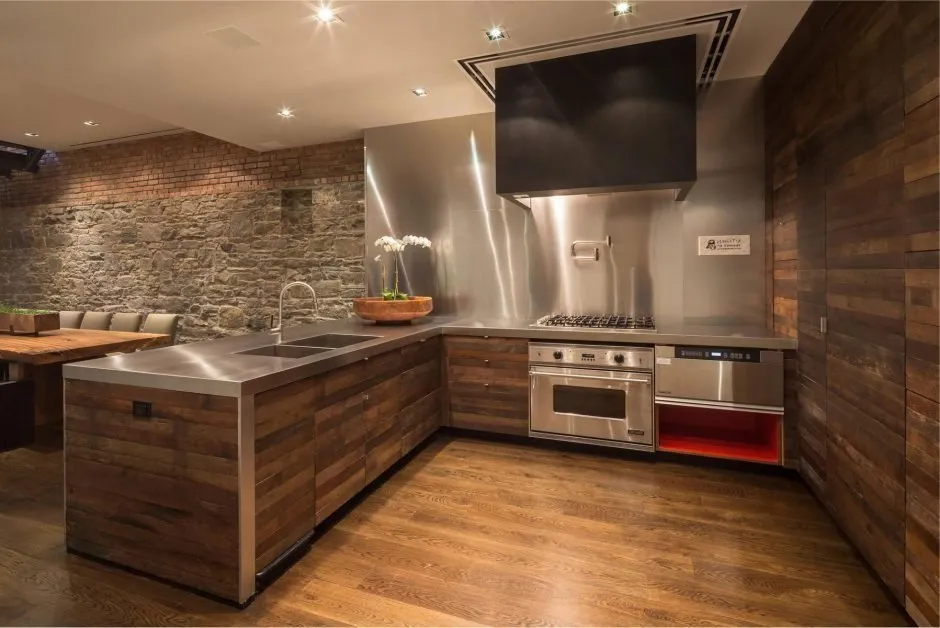
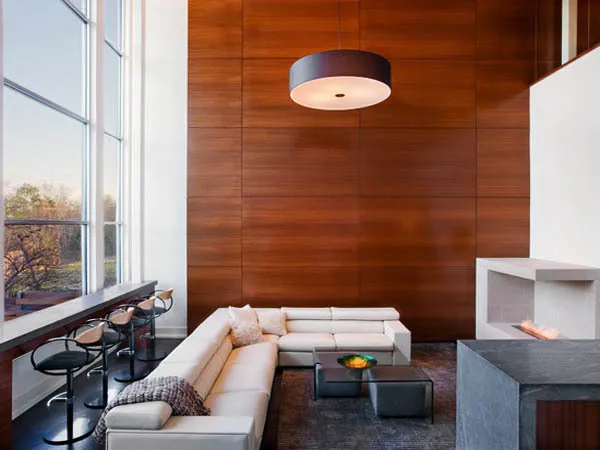
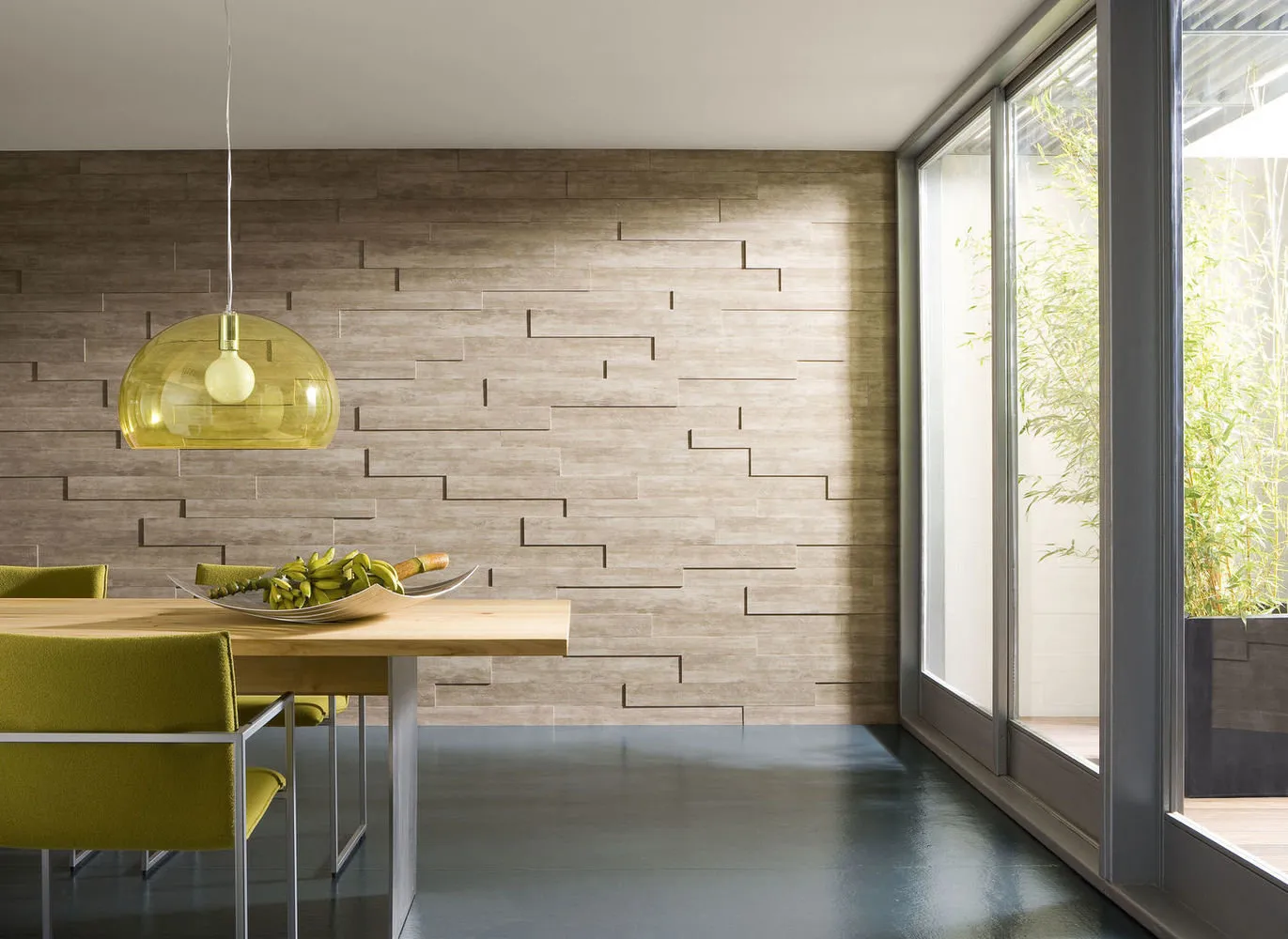
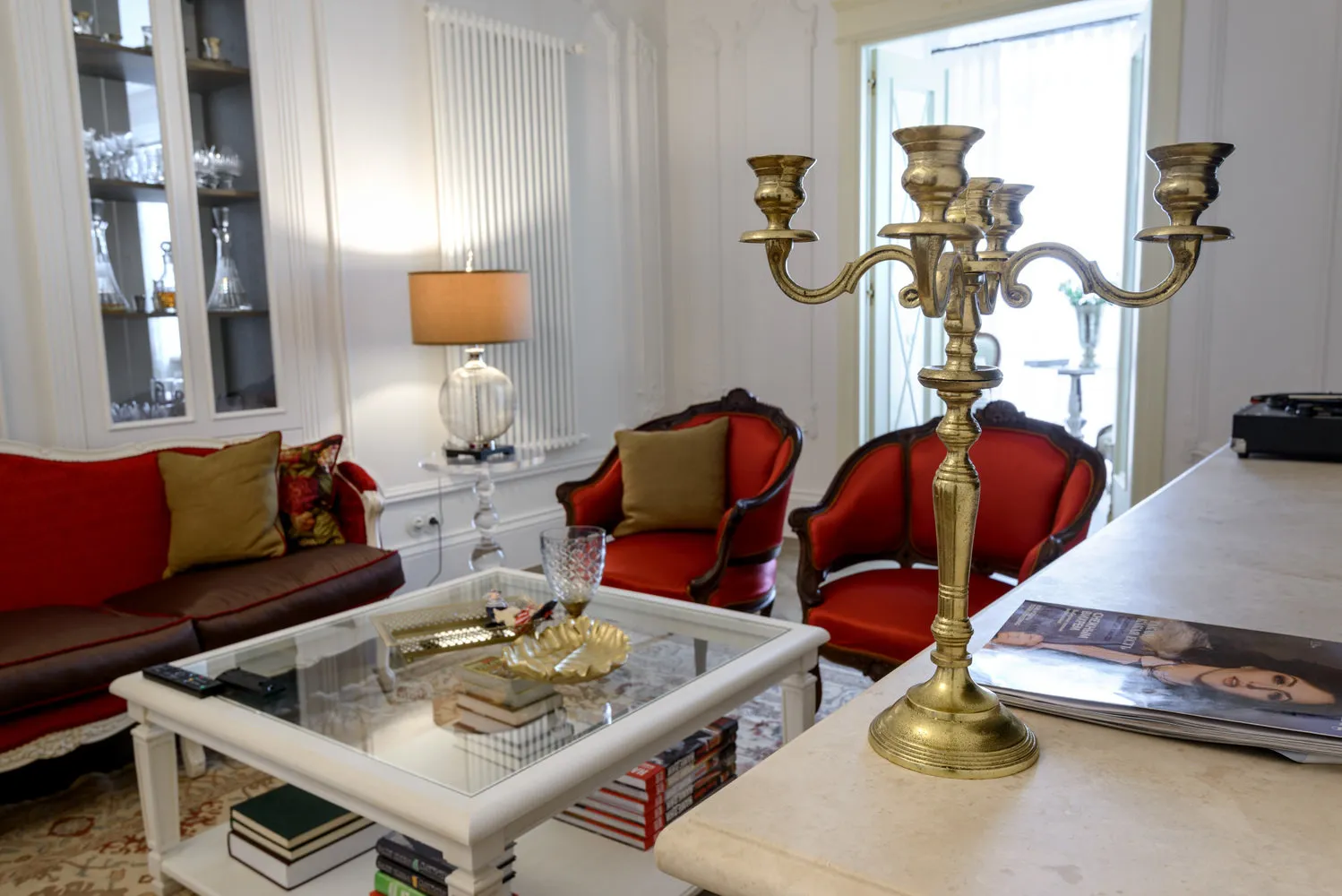
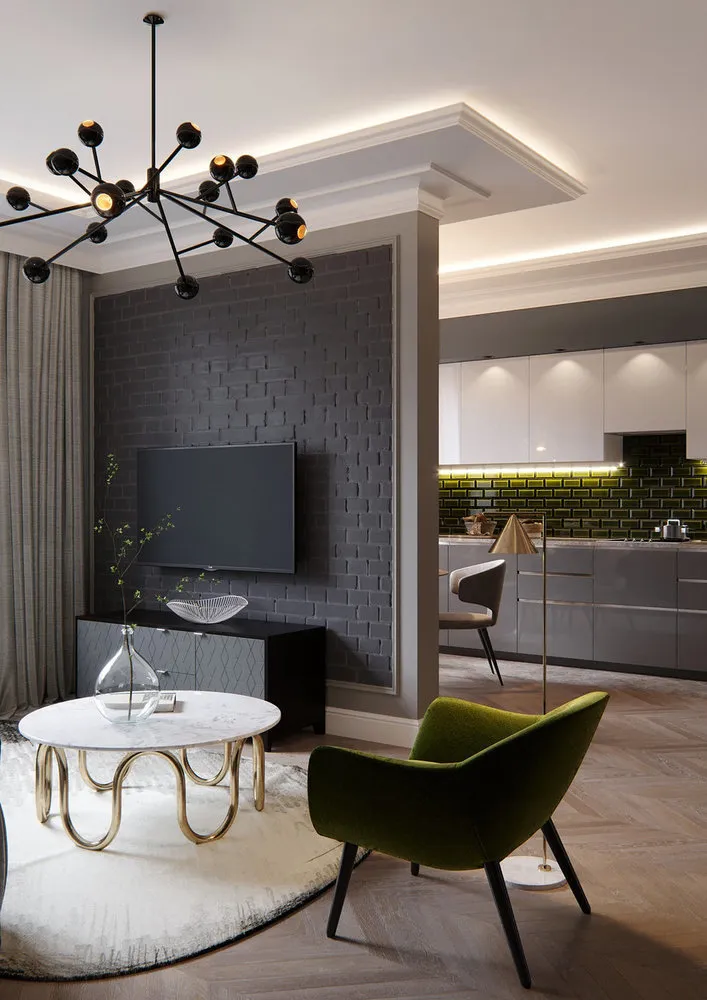
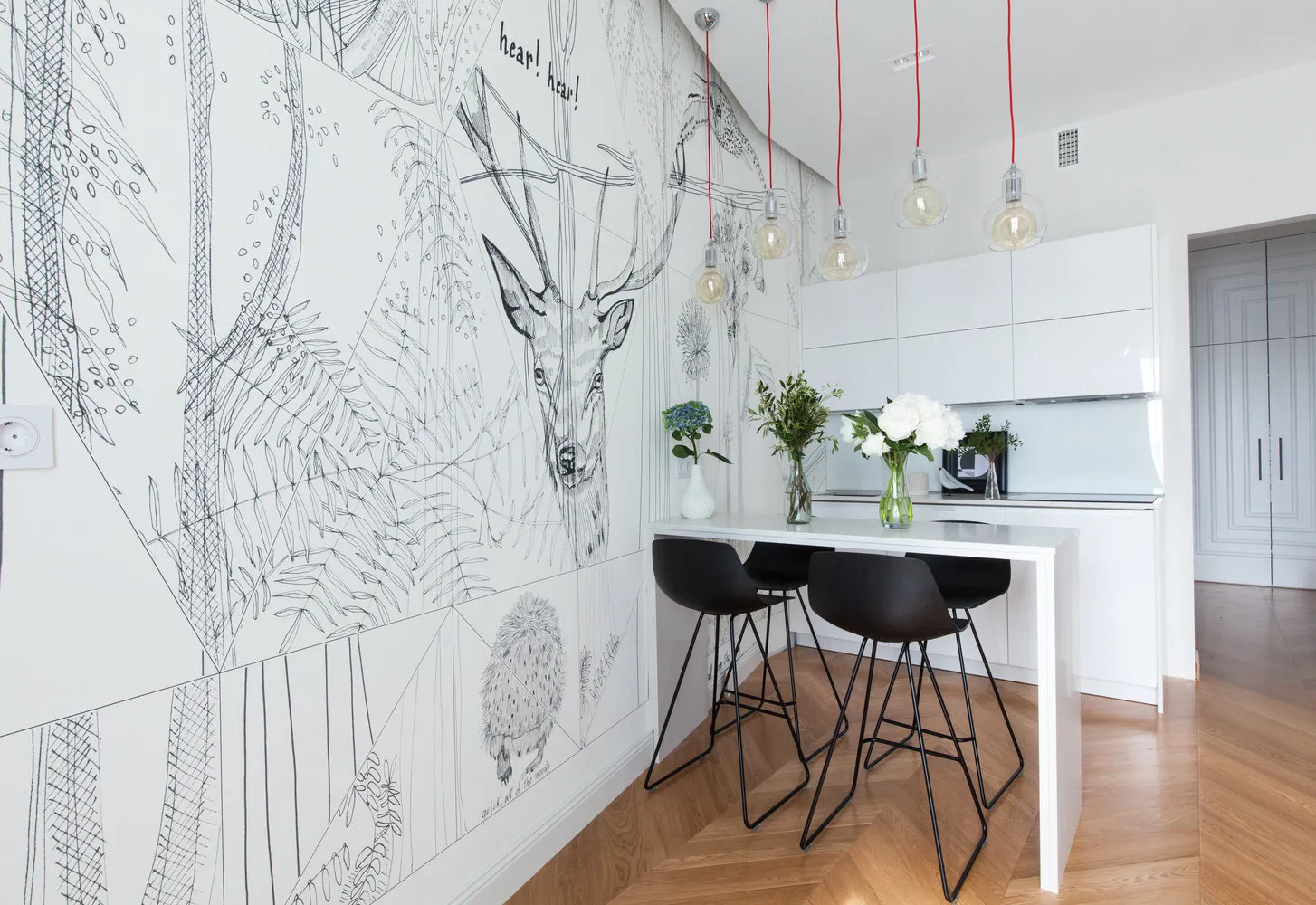
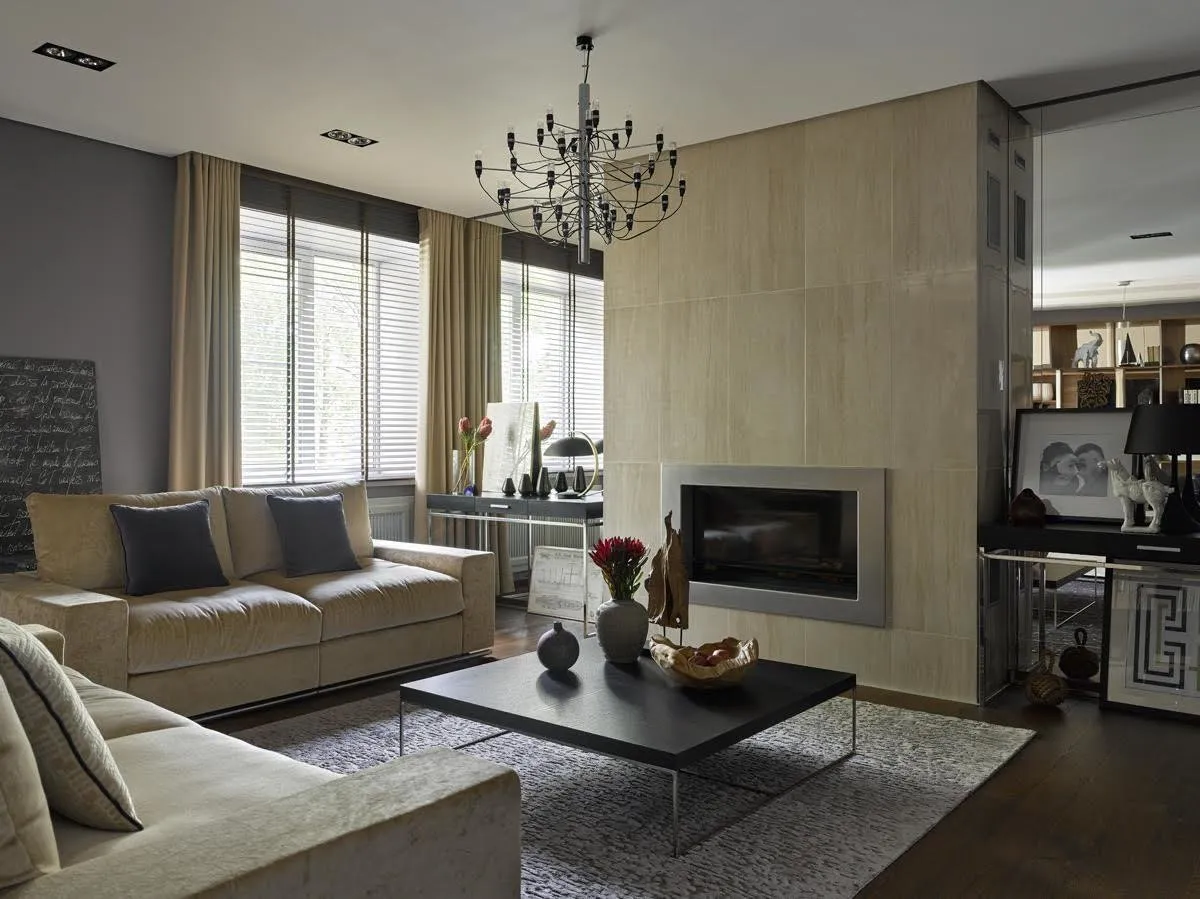
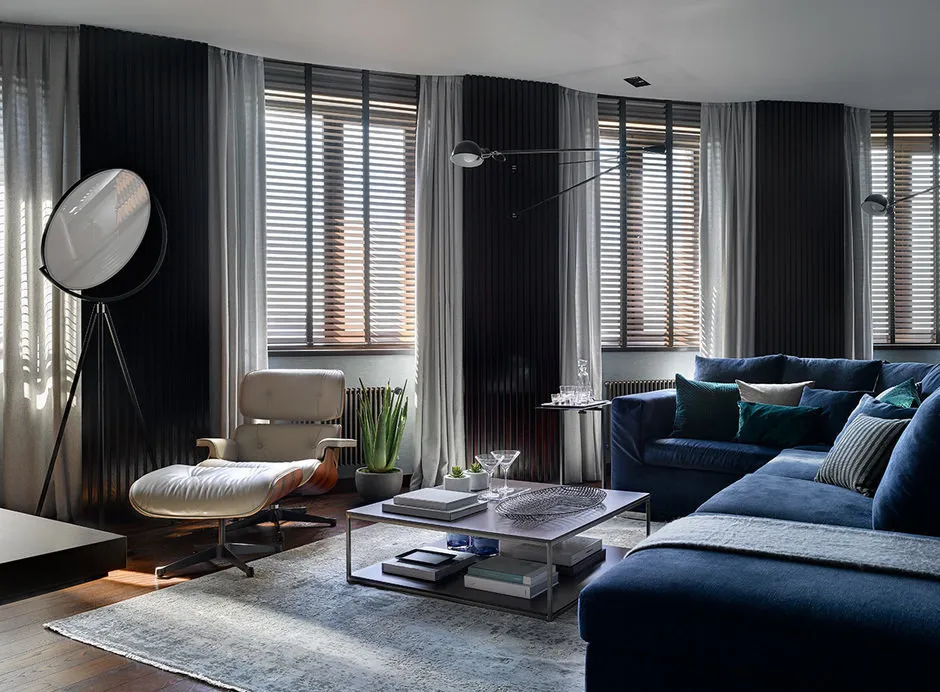

Design: Vitaliy Martynov and Anastasia Rykova, S-Style Studio
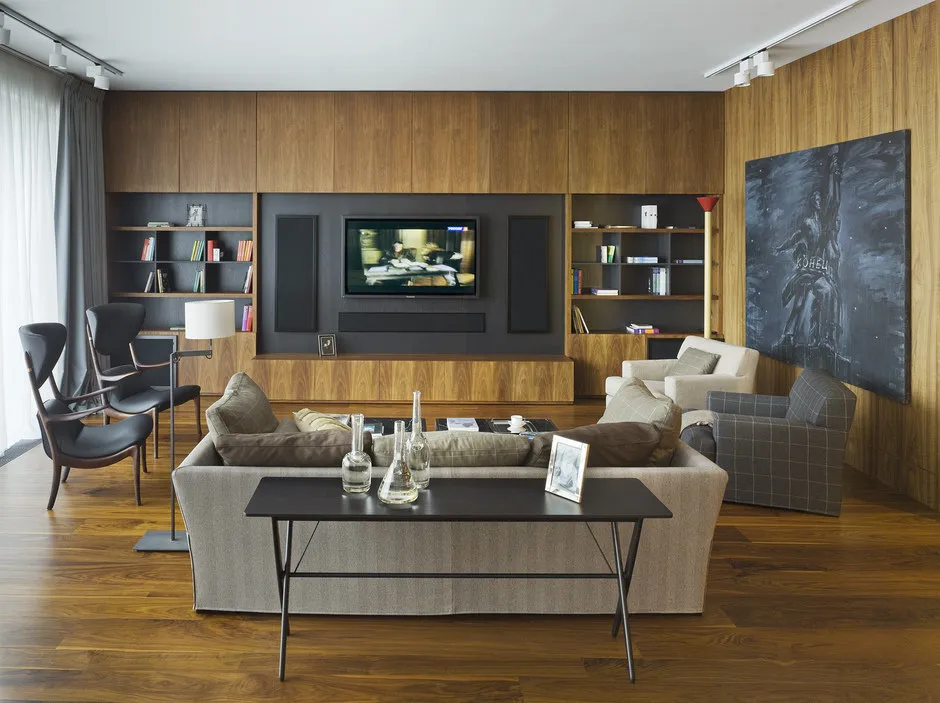
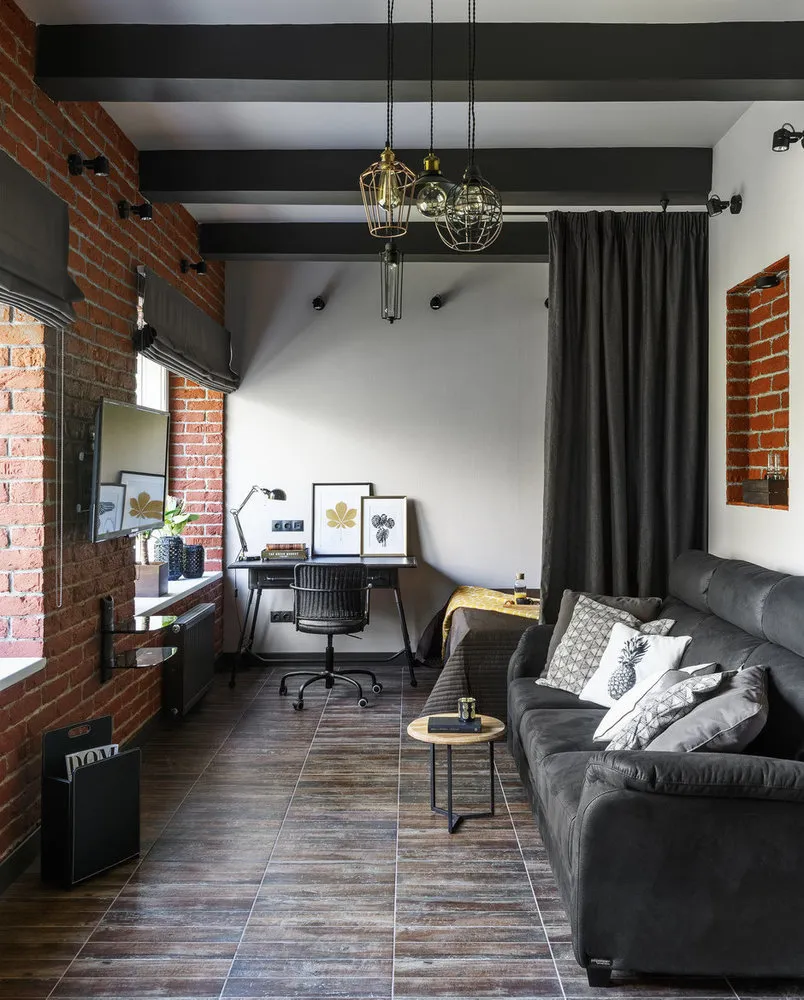
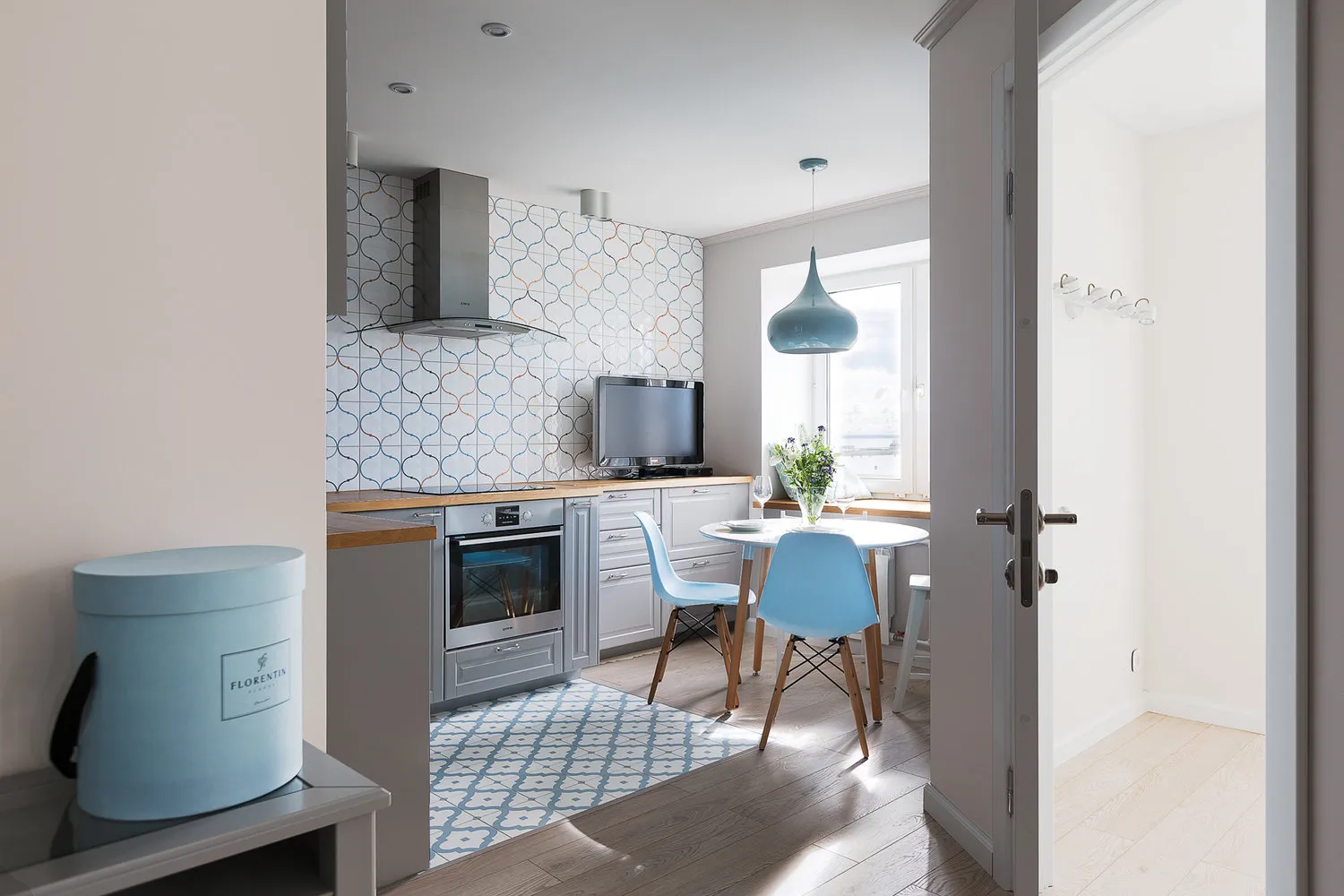
Design: Nika Rusanova
On the cover: Design project by Marina Evtigneeva.
Need a renovation specialist?
Find verified professionals for any repair or construction job. Post your request and get offers from local experts.
You may also like
More articles:
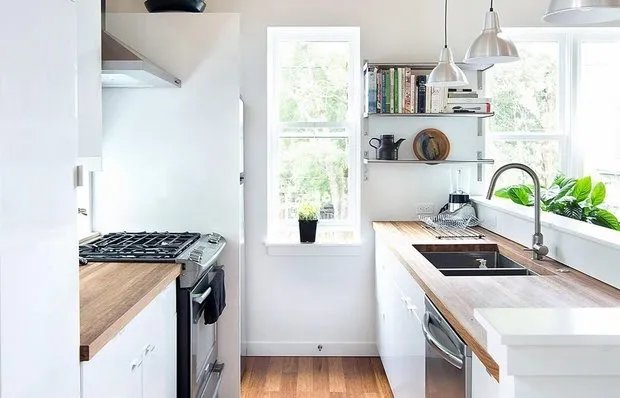 Small Kitchen in Scandinavian Style: 13 Tips for Decoration
Small Kitchen in Scandinavian Style: 13 Tips for Decoration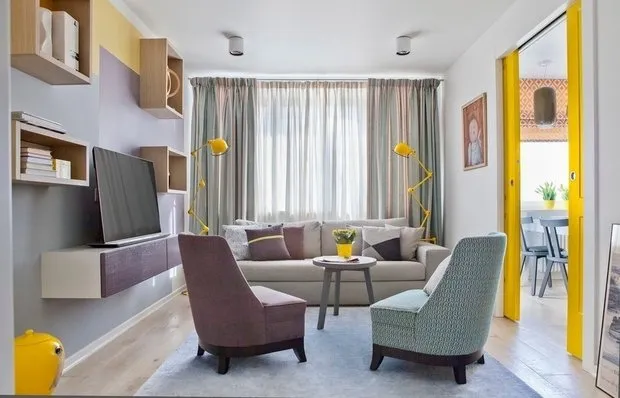 Partition Walls in Interior Design: 6 Tips for Choosing Gypsum Board
Partition Walls in Interior Design: 6 Tips for Choosing Gypsum Board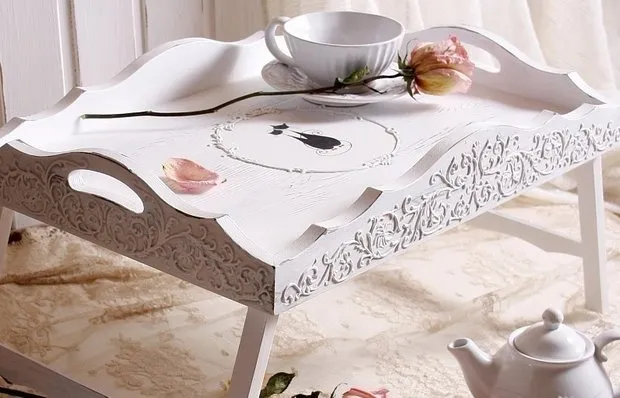 Bedside Breakfast Table: Comfortable and Practical
Bedside Breakfast Table: Comfortable and Practical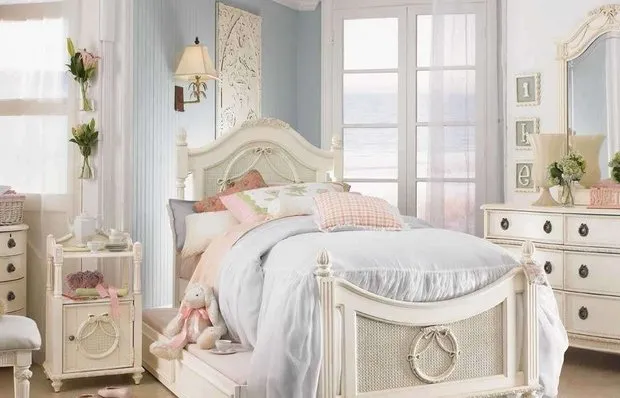 Girl's Bedroom
Girl's Bedroom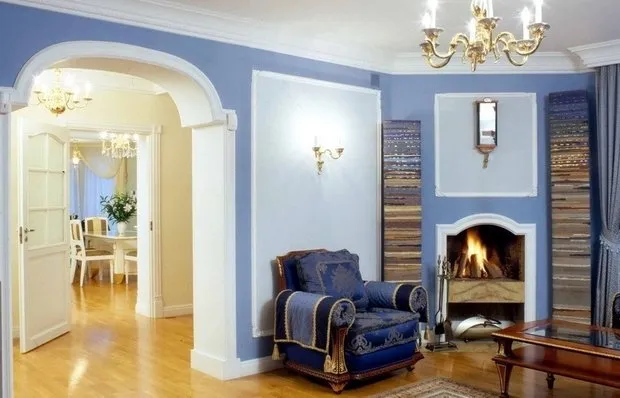 Arches in the Hallway: Photos of Arches in the Corridor
Arches in the Hallway: Photos of Arches in the Corridor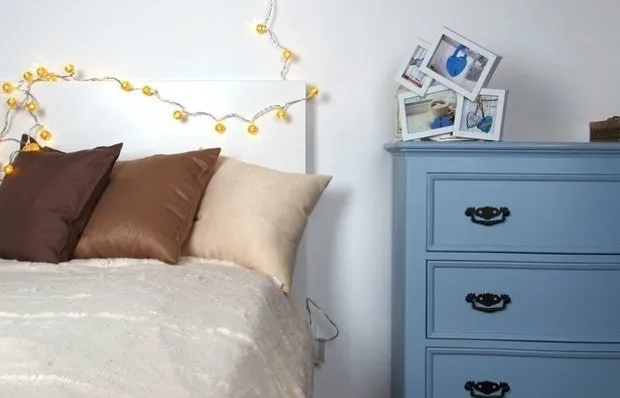 How to Quickly Prepare Your Home for the New Year
How to Quickly Prepare Your Home for the New Year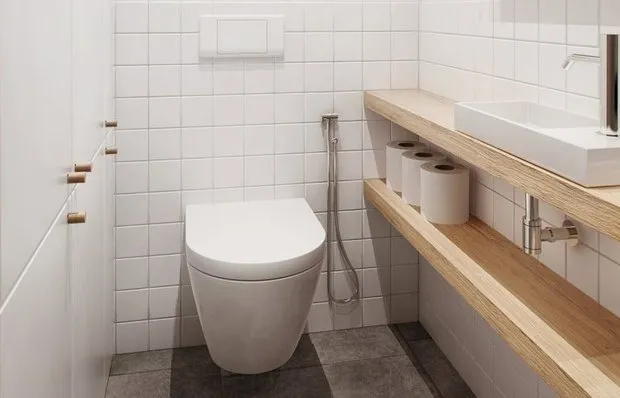 How to Decorate a Small Bathroom: 8 Pro Ideas
How to Decorate a Small Bathroom: 8 Pro Ideas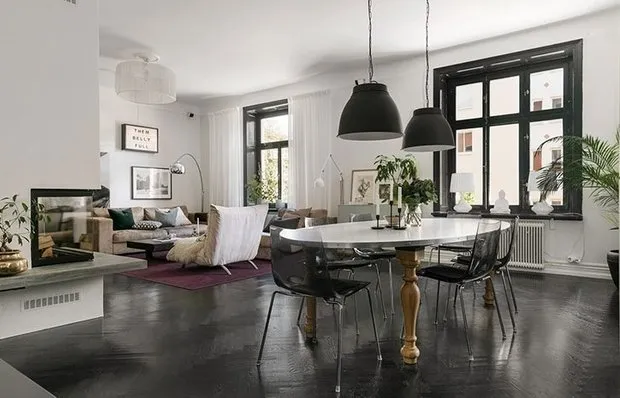 Fresh view on black color: apartment in Sweden
Fresh view on black color: apartment in Sweden